
This is the leading Podcast for Leadership globally. You’ll listen to top authors, C-suite executives and leadership coaches and unlock tips, ideas, insights along with top leadership hacks. It’s your way to tap into some of the best and most experienced leaders and business coaches in the world.
Episodes
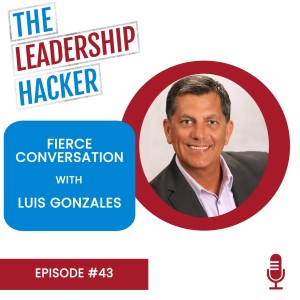
Monday Nov 30, 2020
Fierce Conversation with Luis Gonzales
Monday Nov 30, 2020
Monday Nov 30, 2020
Luis Gonzales is a master facilitator and a global communications expert. We have some fierce hacks from Luis today which include:
- How his multicultural upbringing shaped his corporate career positively
- Why cultures play a significant part in your communication
- Paying attention to one conversation at a time enriches relationships
- Why noticing how your intuition informs conversations is critical
- Plus lots more hacks
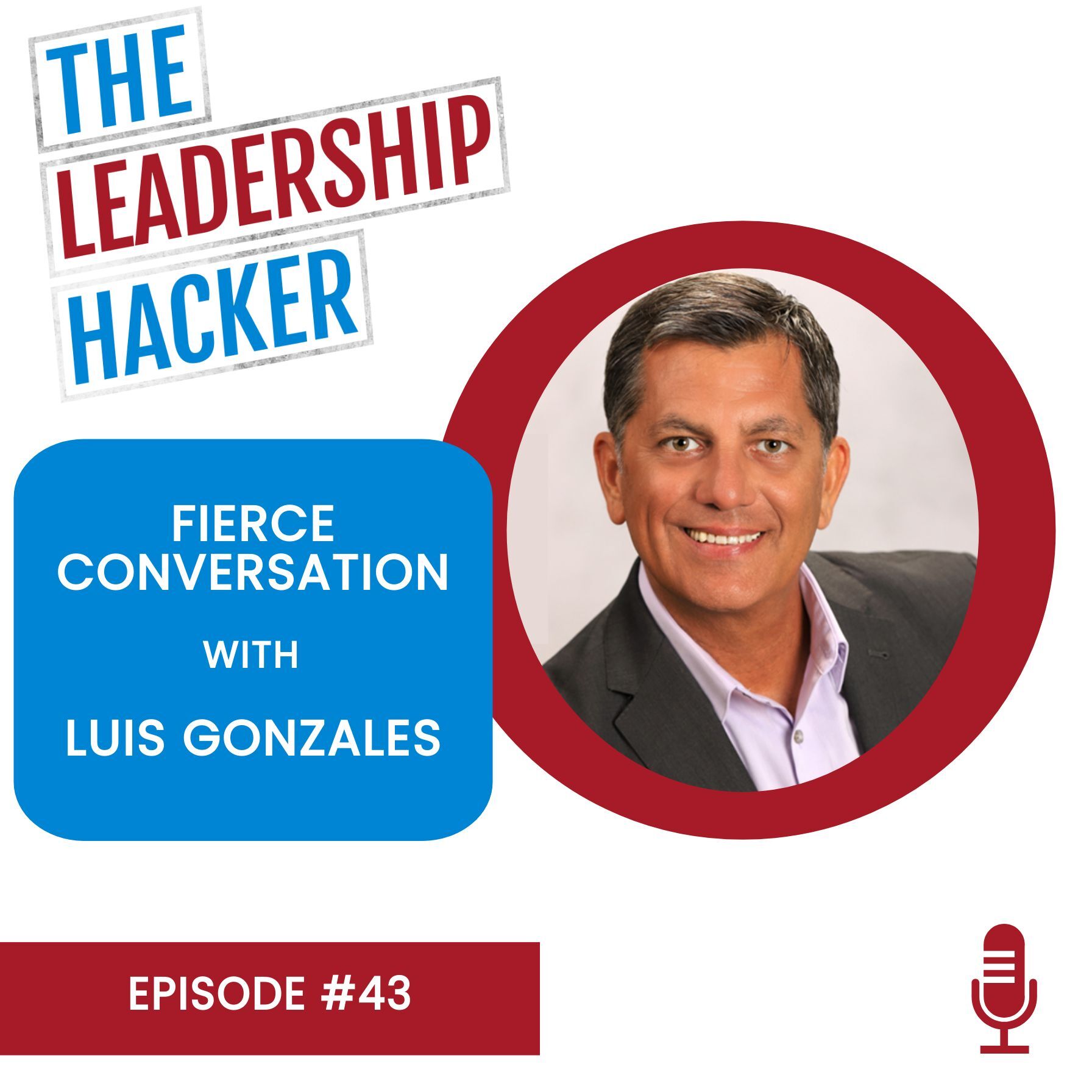
Join our Tribe at https://leadership-hacker.com
Music: " Upbeat Party " by Scott Holmes courtesy of the Free Music Archive FMA
Transcript: Thanks to Jermaine Pinto at JRP Transcribing for being our Partner. Contact Jermaine via LinkedIn or via his site JRP Transcribing Services
Find out more about Luis:
Fierce Inc. Website: https://fierceinc.com
Luis on LinkedIn: https://www.linkedin.com/in/luisgonzales/
Full Transcript Below:
Read the rest of this entry »
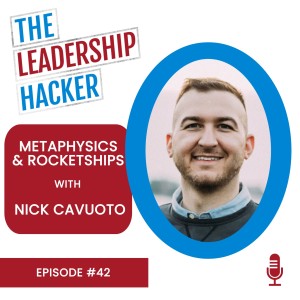
Monday Nov 23, 2020
Metaphysics and Rocketships with Nick Cavuoto
Monday Nov 23, 2020
Monday Nov 23, 2020
Nick Cavuoto Founder at CavuotoX, he is a high-performance business coach, speaker and an entrepreneur mentor, we can learn loads from Nick in this episode including:
- How to unlock your calling and mandate on life
- What Metaphysics is and how we can use it to grow personally
- Why relationships can be like rocketships
- How being in a mood of judgment will stop you from learning
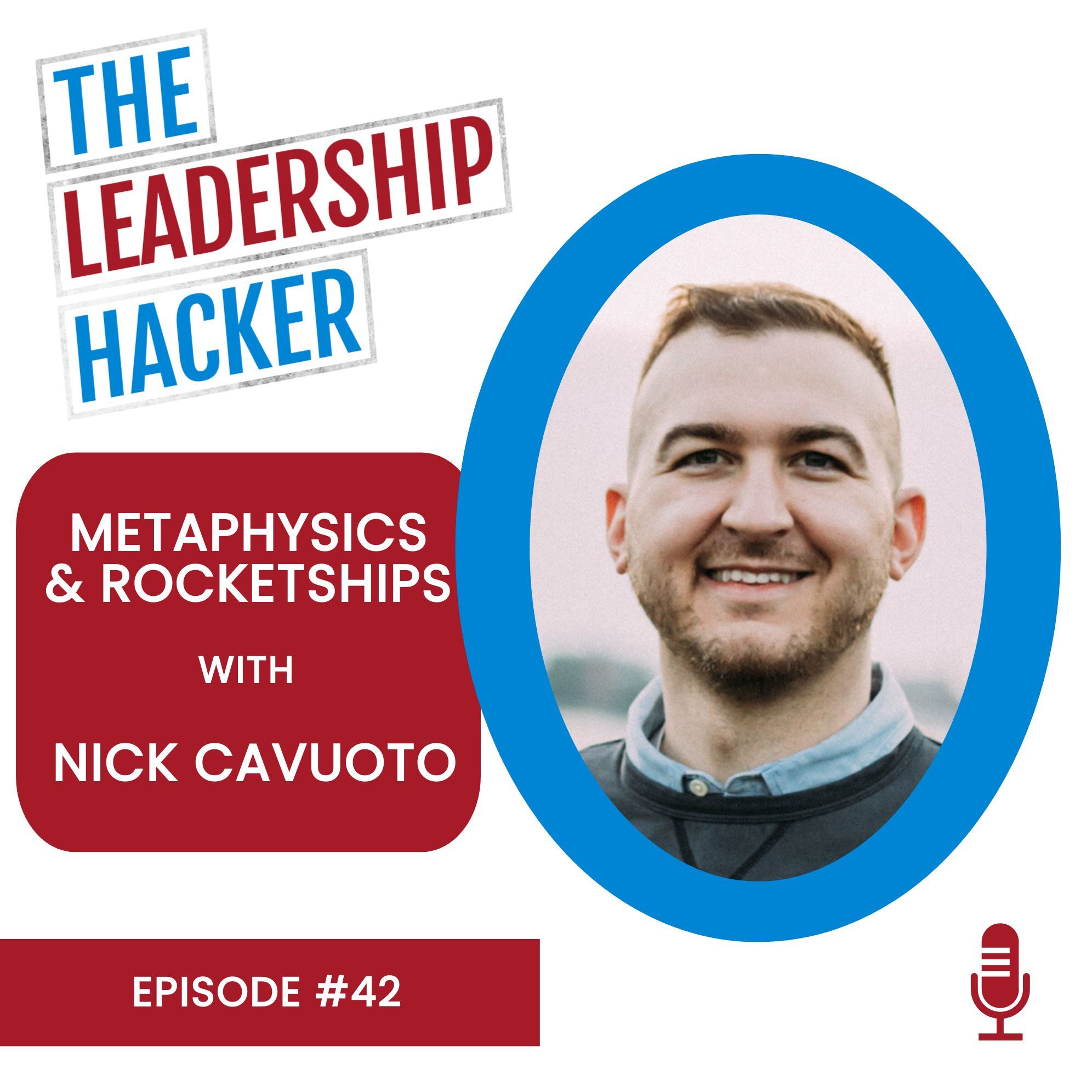
Join our Tribe at https://leadership-hacker.com
Music: " Upbeat Party " by Scott Holmes courtesy of the Free Music Archive FMA
Transcript: Thanks to Jermaine Pinto at JRP Transcribing for being our Partner. Contact Jermaine via LinkedIn or via his site JRP Transcribing Services
Find out more about Nick below:
Nick’s Website: https://www.nickcavuoto.com
Twitter: https://twitter.com/nickcavuoto
Instagram: https://www.instagram.com/nickcavuoto/
Nick on LinkedIn: https://www.linkedin.com/in/nickcavuoto/
Full Transcript Below
Read the rest of this entry »
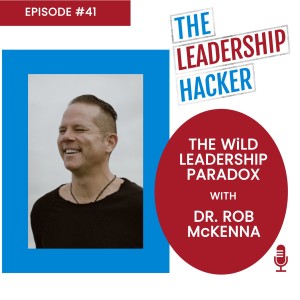
Monday Nov 16, 2020
The WiLD Leadership Paradox with Dr. Rob McKenna
Monday Nov 16, 2020
Monday Nov 16, 2020
Dr. Rob McKenna is the founder of WiLD Leaders, Inc, the WiLD Foundation, and author of Composed: The Heart and Science of Leading Under Pressure. What you can learn in this episode:
- Why vulnerability is essential for great leadership
- How “Whole and Intentional Leader Development” can help you
- The reason paradoxical leadership tension exists
- Understanding why you are here and a sense of purpose is key to leadership success
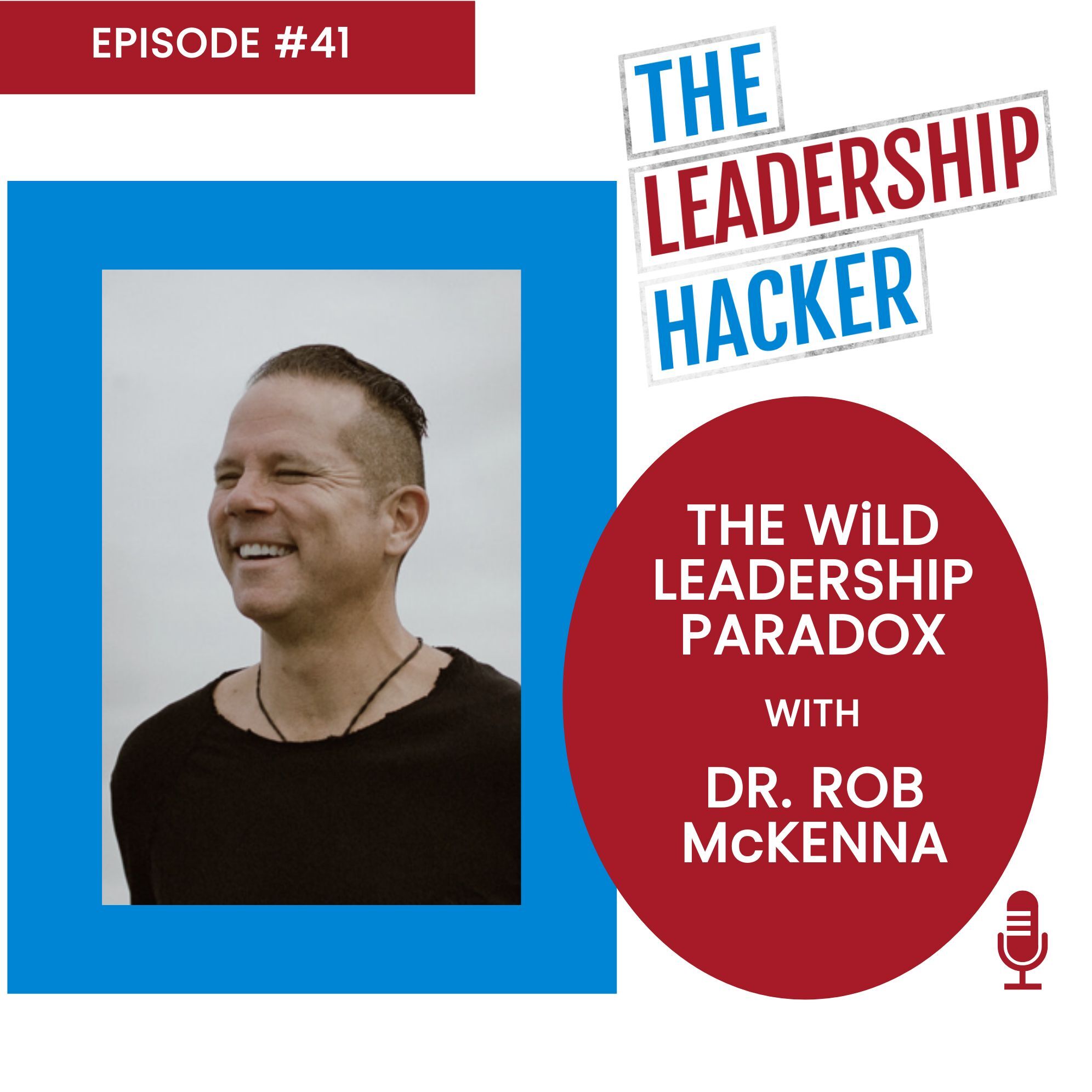
Join our Tribe at https://leadership-hacker.com
Music: " Upbeat Party " by Scott Holmes courtesy of the Free Music Archive FMA
Transcript: Thanks to Jermaine Pinto at JRP Transcribing for being our Partner. Contact Jermaine via LinkedIn or via his site JRP Transcribing Services
Find out more about WiLD Leaders and Dr Rob below:
WiLD Leaders Website: https://www.wildleaders.org
The WiLD Foundation: https://www.thewildfoundation.org
Book: Composed: The Heart And Science Of Leading Under Pressure
Twitter: https://twitter.com/DrRobMcKenna
Instagram: https://www.instagram.com/wildleaders/
Rob on LinkedIn: https://www.linkedin.com/in/drrobmckenna/
Full Transcript Below
Read the rest of this entry »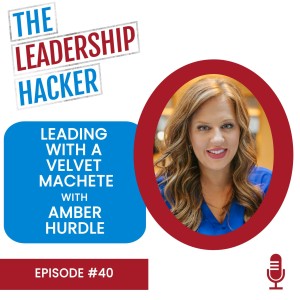
Monday Nov 09, 2020
Leading With A Velvet Machete with Amber Hurdle
Monday Nov 09, 2020
Monday Nov 09, 2020
Amber Hurdle is the CEO of Amber Hurdle Consulting, a multi-award-winning talent optimization firm; she’s a speaker, author and podcast host of The Bombshell Business Podcast. In this episode, learn from amber About:
- How self-awareness can kick start your Brand refresh
- The “data’ parallels of global brands vs. personal and company brands
- How to sharpen your brand with the “Velvet Machete”
- Why self-assessment and continuous learning makes you greater
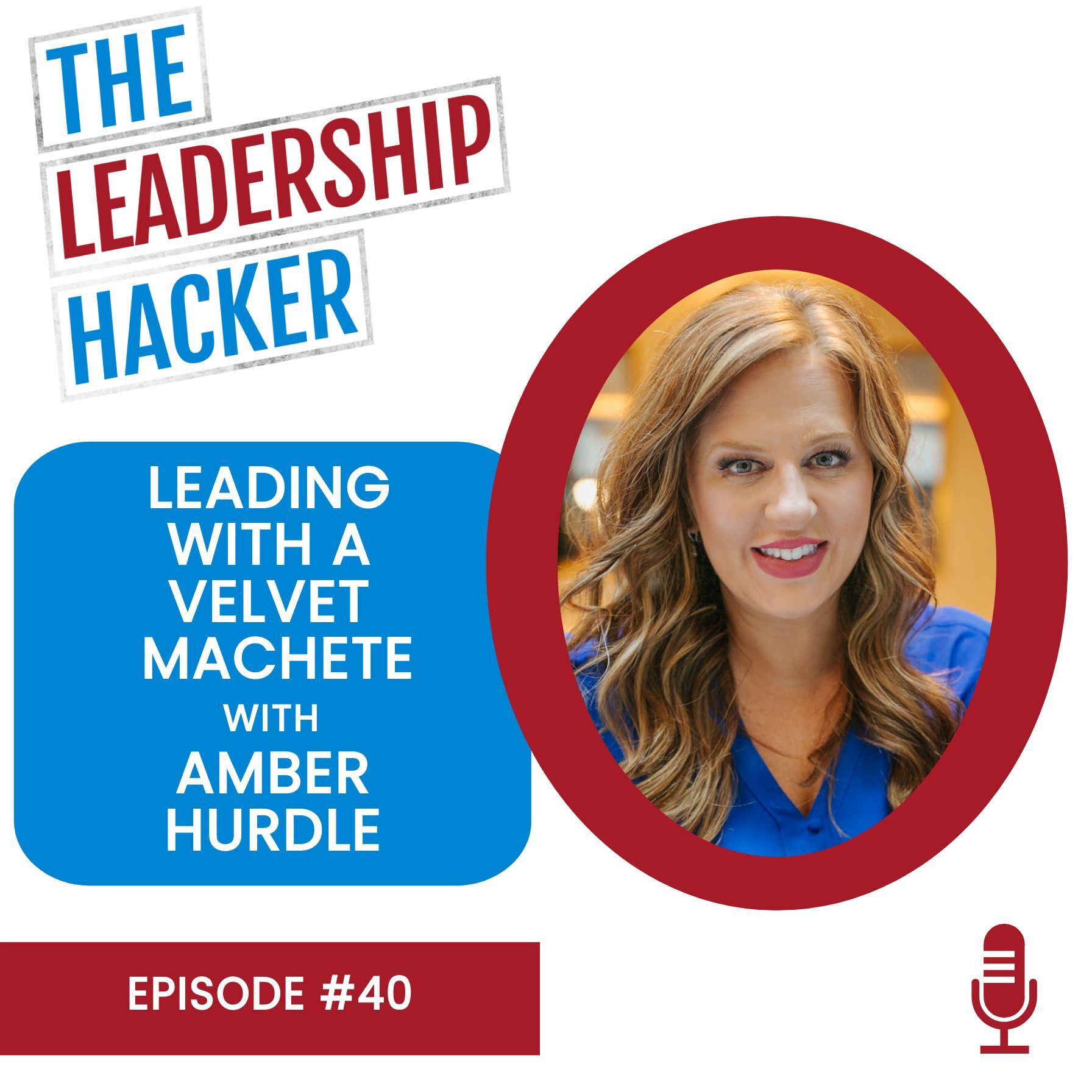
Follow us and explore our social media tribe from our Website: https://leadership-hacker.com
Music: " Upbeat Party " by Scott Holmes courtesy of the Free Music Archive FMA
Transcript: Thanks to Jermaine Pinto at JRP Transcribing for being our Partner. Contact Jermaine via LinkedIn or via his site JRP Transcribing Services
Find out more about Amber below:
Amber Hurdle Website: https://amberhurdle.com
Twitter: http://twitter.com/amberhurdle
Instagram: http://instagram.com/thevelvetmachete
LinkedIn: http://www.linkedin.com/in/amberhurdle
Full transcript below
Steve Rush: Some call me Steve, dad, husband or friend. Others might call me boss, coach or mentor. Today you can call me The Leadership Hacker.
Thanks for listening in. I really appreciate it. My job as the leadership hacker is to hack into the minds, experiences, habits and learning of great leaders, C-Suite executives, authors and development experts so that I can assist you developing your understanding and awareness of leadership. I am Steve Rush and I am your host today. I am the author of Leadership Cake. I am a transformation consultant and leadership coach. I cannot wait to start sharing all things leadership with you.
Amber Hurdle is the special guest on today's show. She's the CEO of Amber Hurdle Consulting, a multi award winning brand ambassador and talent optimizer. She's also the host of The Bombshell Business Podcast and author of The Bombshell Business Woman. But before we get a chance to meet with Amber, it's The Leadership Hacker News.
The Leadership Hacker News
Steve Rush: In the news today, we explore the upsurge of the use of digital technology and whether it's transferred power to the people. Sally Helgeson, who was cited by Forbes as the world's premier expert on female leadership, discusses how homeworking facilitated by digital technology has reversed the balance of power from capital to people. In 1993, Peter Drucker published Post-Capitalist Society. It has extraordinary lessons for leaders today, as we seek to emerge from the confusion, the pain and disruption of our pandemic 2020 society. Drucker was referring to the fact that capitalism became the primary means of production to the scale and complexity, requiring significant capital investment. Capital had by far the greatest valley in the chain of production. So, it grew to become quite expensive while the cost of people and labour became relatively cheap. As a result, the primary means of production, which of course was industrial machinery had to be centralized in factories and later in offices, via computers and tech, which meant that most people could no longer work from home. These two factors combined gave power in those who either provided a capital for enterprise or investment, or indeed hired to exercise it, that is senior management, but Drucker foresaw that the economist of the digital technology would reverse this basic logic. The digital tools that made such a transformative impact over the last 20 years are vastly more dependent on human knowledge and creativity than on raw materials and heavy machinery. As Drucker said, those tools began to reverse the balance of power between people and capital. And since people began to own the primary means of production, which of course is our brains and our thinking. That's what distinguishes the knowledge economy. And it's the reason why a new idea can make a hundred years of what was seen to be thoughtful, intensive capital development, almost obsolete overnight. And it's the reason why we now view leadership as something that should be distributed through organizations, rather than let the sole top of those leading the organizations.
This year, it's taken on a fresh perspective as individuals around the world had to spend months working from home and organizations have had to adapt really quickly to this new reality. And it's fortunate that technology has reached a point where it allows us to do this, and we can now see that the trend in working from home or working at home is already well underway. So, what will it mean going forward for the primary means of production? It will be engaged within people's homes, places of where once we used to be housed prior to the industrial revolution. In short, Post-Capitalist Society that Drucker foretold almost 30 years ago is now suddenly and with force upon us, it's consequences will reshape our organizations, our lives and for the next century, and as leaders now more than ever, we need to be thoughtful and help our teams reframe that perspective and consider what their mindset is for the future.
We may need to consider our homes as now our place of work. Stereotypes that we may have had such as stay at home moms or stay at home dads become obsolete and many more biases and assumptions could present themselves. But our job as leaders is to listen for those assumptions to challenge and to test them and to recognize that no longer capital will drive the future, but it's our people themselves. That's been The Leadership Hacker News. If you have any interesting stories or news that you'd like to share, please get in touch.
Start of Podcast
Steve Rush: Amber Hurdle is our special guest on today's show. She's a multi award-winning consultant and business partner, a brand expert and author of The Bombshell Business Woman. Amber, welcome to The Leadership Hacker Podcast.
Amber Hurdle: I am so grateful to be here, thank you.
Steve Rush: You have a really interesting backstory from team mom to CEO. How did it all start for you?
Amber Hurdle: On the struggle bus? So just kind of going way back to the teen mom days, that seems so long ago, there was a big why, and that was giving my daughter every opportunity in the world that a child not born to a teen mom would have. And that is a commitment that I made in the hospital, indignant. That was mission critical, and with that, even though I stumbled and made a lot of terrible, awful, horrible, decisions, I did find a way to continuously fail forward in the interest of pursuing that big why. So, through that process, I had to learn at the time I had no idea what this current buzz term was, but I had to learn how to develop my personal brand so that I could position myself to get better shifts at work, to get a job I might not be fully qualified for to be able to attract the right people and opportunities to me so that I could raise this child who was brilliant and deserved better than what I brought her into this world into.
So as that continuously enabled me to move forward with success, I began to do various things to help support that, that in turn became things that I would help team members with or employees with or colleagues, or eventually when I went back to college, because I figured out there's this word for this thing that I do and it's called public relations. And then I discovered the world of internal relations. And so, I started using the same principles and the confidence that came with it because I knew that it worked because I've used it on me and everyone else. And now I'm dealing with senior leaders in my career and I'm helping shape their personal brands, like an internal publicist of sorts and increasing their influence. And it's just gone from there, I've worked with celebrities, I've worked with, I mean, you name it, I've done it. And I'm 41 years old and abundantly blessed that I get to be the wounded healer that I get to be someone who can pursue her purpose through her vocation.
Steve Rush: That's awesome Amber. And I guess part of that failing forward that you talked about ,was also maybe being brand aware at certain parts of your life. So, you could pivot your career accordingly. Would that be kind of fair?
Amber Hurdle: Oh, absolutely. You know, I was sitting at lunch with a childhood friend, someone who I've been friends with since high school. This was a few years back, and he was looking at maybe shifting his career a little bit. And he said, Amber, you're just the Madonna of professional life. You're constantly evolving and reinventing yourself. And I looked at him somewhat confused because I didn't perceive it that way. And I said, help me understand that. Can you say that a different way? And he talked about the different pieces of my career and I just looked at him and I said, that is all me wrapping everything that I do into communication and engagement. That's the vehicle, that's what I do. I'm able to communicate. I can teach other people how to communicate. I know how to engage. I can teach other people how to engage.
And throughout my career, whether I was a celebrity event planner, whether I was an internal you know, employee relations person, whether I was doing PR work or whatever, fundraising and Scc College, it was all about communication and engagement. So it is that, you have to really clearly understand what your gifting is. You have to understand what uniquely makes you, you. And so, anybody can do communication and engagement, right. I can define and position, my value by saying, I can do that and that I can do that because I was forced to learn the hard way through my teen mother experience.
Steve Rush: Right, yeah. It's huge lessons that you probably experienced much earlier in your life than most folk would've done. Right?
Amber Hurdle: Absolutely. I was chatting with a friend last night who is just so advanced. I mean, I just asked him like, why are you so smart? How did you get so smart? Cause you didn't go to college or in your neck of the woods, you didn't go to university. But he just has this wealth of business knowledge. And he said, you know what, Amber, you became an adult way early. You're a decade ahead of your peer group. I started my first business when I was 17 and its those same principles. It's just that dumb youth of learning the hard way and actually having enough energy may be to recover from the ridiculous mistakes that you make. But because we made them so young, it catapulted us forward into having a deeper wisdom around whether that's life or business or, you know, anything like that.
Steve Rush: And academia of course, is not a prerequisite for entrepreneurialism. In fact, most entrepreneurs, I know actually have less of an academic background than the former.
Amber Hurdle: Yeah, because we never stop learning. We don't go to school and then say, okay, I've learned everything I need to learn. I wrote everything I had to write. I've read everything I need to read and I'm sick of it, so the end. Again, and I have to credit my friend for kind of bringing that up last night. Good timing for this interview. When you're an entrepreneur. I mean, I just think about this year alone, everything that I've had to go back and say, okay, now I need to learn how to do this. I need a refresher on that. I haven't really learned this in probably about four years. So, what's changed? I need to learn that. So, I've taken four different courses. I'm constantly watching YouTube. We have to do that to respond to the ever-changing business environment that we're in. And when you think of learning or of my personal education or my personal intelligence being attached to formal education, you really missing out.
Steve Rush: Yup, get it. A hundred per cent subscribe to that whole principle of continuous learning and evolution is just what makes you greater. So, in your consulting world now, you've managed to unite branding and science together to really help amplify that human capital when it comes to brands. Tell us a little bit about how you've done that?
Amber Hurdle: So, branding background, PR of course. The way that big businesses approach branding their marketing is how I approach that with individuals in terms of personal brands, as well as employee bases in terms of employer brands. And so, my velvet machete brand strategy believes that if you have strong leaders with strong personal brands, they can then lead strong employer brands where people feel really excited about coming to work. They understand where their gifts and their talents and their experience fit into the big picture. And when you have happy employees delivering at that peak level, then you have a strong business brand because your customers are satisfied. Things are getting done the way they're supposed to be done. You don't have as many errors or, you know, whatever that looks like you, you know that you have a strong business brand cause it's from the inside out. So, with that in mind, let's think about like Nike, Nike does millions of dollars’ worth of market research before they do any type of marketing campaign. And so, what they have to do is figure out from data, whether that is cookies on their website, tracking, you know, where are you clicking? How long do you stay on a page? Whether that is through loyalty programs, it could be focus groups, whatever. They have to have data. They're going to take that data to understand the big picture what's going on inside of their brand, how they can most efficiently and effectively market. And they'd start to develop ideal customer profiles so that they can speak into the emotions of their customers and potential customers. Now, why don't we do that internally?
Steve Rush: Right.
Amber Hurdle: We need to do the same thing. We need to canvas our entire team. We need to understand who's working for us. We need to understand what does that landscape look like so that we can speak to them emotionally about their contributions, about why they are with our organization and why we all share the same philosophies and values and that sort of thing. That is the bedrock of our culture. And then as we hire just like Nike creates ideal customer profiles and their messaging, their brand doesn't change. Their "Just Do It". Their brand doesn't change at all, but their messaging changes. If they are targeting an elite athlete who might need some performance gear versus a soccer mom, who's just going to wear her athletes aware at target, very different people, very different messaging, same brand. So, if you look at that from the perspective of your employer brand, you have the same brand. You are who you are, these are your values, you know? And so, you need to create ideal employee profiles for each position that you are hiring.
Steve Rush: It's almost the same process that Nike is deploying isn't? But just internally, with an internal lens.
Amber Hurdle: It is, and it's so funny when I get invited into a company. I was recognized and I'm not tooting my own horn. I'm just saying, it's not novel. But I was recognized by global gurus as one of the top 30 brand professionals thought leaders for 2020, because my perception of branding is different from the inside out. And I'm just like, to me, this is so obvious. If you have the data and you know where the holes are in your team and you know, behaviourally what type of person you need in that role and, you know, personality-wise, then you can start using data to help you make informed decisions, just like Nike uses data to make informed decisions. Now you can market, now you can recruit, now you can retain and keep everybody happy, just like we do with our customers. I don't see the reach in that, but apparently, it's a new thing to talk about.
Steve Rush: It's an awareness thing, I think.
Amber Hurdle: Yeah.
Steve Rush: What you're describing is just that internal lens shift. Now the five-step process that you've developed with your velvet machete, and by the way, I just love the visual metaphor. Velvet machete, I think it's brilliant because I'm a visual kind of guy anyway, so I can almost see this really soft little machete coming down to me, but I know that it's going to take me through proper rigorous five-step process. Let's get into that and talk about how that can maybe help some of our listeners think about their own brand awareness. So, what are the five steps?
Amber Hurdle: Let's just start first with the concept development machete. So, the machete cuts to the chase. It is a direct way of communicating and influencing, but the velvet wraps the message in a way that's appealing to your unique audience. So just like Nike has different messaging. So does the velvet machete process. So, we need to keep that in mind, as you move through these five steps. Now, first and foremost, you have to become self-aware. So, as you're building your personal brand, which is step number one, you have to be able to confidently define and position your value. You have to know what you bring to the table. And I've got of course, tons of exercises that get you to that point. But only when you understand yourself, can you start to move through the rest of these processes. So, step number two is then building supportive environments, creating systems and structures that uniquely support your efforts.
So, if I know I am excellent at whatever, I need to create environments around me, whether that's people environments, or how my workflow is set up, it could be spiritual or physical or mental environments that I need to put in place to fortify those things that are great about me. Now, a lot of people like to talk about strengths and weaknesses. I can't stand to do that. I'm not a weak person. I'm also not amazing at advanced math. And so, I'm not going to say, well, that's a weakness. It's just not helpful. Me doing advanced math is not helpful to my mission.
So, with that in mind, I just bubble wrap that just like fine China. Beautiful, precious, expensive, valuable, fine China. It's not weak. It just is fragile. And so, we bubble wrap it to ship it across the country. So, whatever is fragile in your toolbox of resources, we need to bubble wrap that. So, for me, I have a CPA, I have a bookkeeper and I have someone who handles payroll. Okay? So, they teach me, but that's my bubble wrap. And you can do that in all areas of your life. But here's the beauty. When you are very confident in who you are and what you bring to the table, and then you create all of these environments to really strengthen, being able to do that. And then instead of being like, oh, I wish I was more, blah, blah, blah. You just bubble wrap that stuff. Now, now you're really moving forward with confidence. And my velvet machete leadership Academy is all about becoming a competent, compassionate leader, having that velvet machete balance. Once you have that in place and you are strong, your foundation is strong only then can you move on to mastering your communication. Because now we're including other people. So, if you're not solid is really difficult to begin to interact with others. So, you have to be able to speak with authority while listening with intent to drive results. So, I know who I am. I know what I bring to the table. Now I'm listening to you with intent. I'm being able to communicate like Nike in different ways for different audiences, with that velvet machete style that I have. And once I can master that communication, and I understand how to have a two-way conversation with my various key stakeholders, then I can move on to step four and truly mastermind engagement. And that's when I use my self-awareness, my ability to understand what type of environments I need, my ability to communicate. And once I see and harvest the greatness in others, I can rally their support. And that's where people get hung up. That is the billion-dollar problem. And I'll tell you, I was with a client a handful of weeks ago, and she is a dynamo. I mean, she's just amazing and has all kinds of experience and is pretty senior in her role. And she was stuck because she'd been working for months on something, but she could not get the buy-in of somebody that would move it forward, which would save the company a billion dollars.
Steve Rush: Wow.
Amber Hurdle: I'm not joking, billion with B. And so, we worked through how she could frame that in order to get that buy-in, to move it to the next phase of approval. She killed it. She not only got in that next phase, but she got the next phase and everything came to fruition. They're following her plan. They're going to now move forward, trying to save the company a billion dollars. She could not have done that without self-awareness, without the environments that she needed to support her, without understanding her communication style and how she needed to communicate to this initial key stakeholder plus the next round. And if she was unable to rally support from this person, that company would not have her extreme intention, her gifts, and the gifts of her team to save them a billion dollars with a B. So, once you've done these four things, now you can build influence. Now you can guide and focus people and processes towards success because now this person has everything that she needs. And so, everyone knows the goal and she can just rally that support. And then build on that, moving everyone together towards saving that billion dollars. This process is not like, oh, these are soft skills. And everybody needs to, you know, we need to increase our emotional intelligence. Blah-Blah-Blah fluffy, fluffy unicorns.
Steve Rush: Yeah, exactly.
Amber Hurdle: We're saving a billion dollars here people, this is important.
Steve Rush: The one thing that I observe when I also coach execs is that this persona, if you like of soft skills presents itself quite a bit. And I always have the conversation that says there's nothing soft about having great communication skills, being able to engage and influence people. That's real hard skills. What about some of the baggage that comes with the language that we internalize with ourselves?
Amber Hurdle: That is why I call it a relevant machete. I mean, that doesn't sound very soft. The velvet does, but that's my way of bringing awareness to. This isn't child's play, we're not on the strengths couch right now. This is an internal fuzziness. Now, anybody who works with me understands that I have no differentiation between professional and personal. We do not compartmentalize our lives. We are a whole person, and all of that is going on all at the same time. And especially if your career is a manifestation of your purpose, then now we're really coagulated. It's all put in a blender together. And so, yes, when we're talking about our environments and when we're talking about our personal brand, we might have to go into some deeply personal places, but at the end of the day, if you do the work, and that's what I tell my clients all the time, you have to do the work. If you're willing to do the work, then you're empowered into that competent, compassionate leader. That leader who can influence because people see your authenticity and they are inspired by your ability to show them how their contributions fit into the bigger picture.
Steve Rush: I love that five steps, by the way. I think it's a really neat way of just thinking about the process you need to go through. And like you say, this is not soft. This is proper work, isn't it?
Amber Hurdle: It is, and I appreciate that feedback. Thank you.
Steve Rush: So, you've also turned to writing and you've authored the book, The Bombshell Business Woman. Tell us a little bit about what the inspiration was for the book?
Amber Hurdle: Sure. So, when I left corporate and I began working with organizations through consulting and training and speaking, I had several female friends, acquaintances who came to me and said, wow, Amber, you know, you really have branded and marketed yourself well. I'm really struggling with that in my business. And so, I find myself kind of having like a part-time job of helping friends to position themselves. And of course, my whole career is PR, marketing and that sort of thing in various forms. And I've owned other businesses where I've done this successfully. So being the type of person who likes to pay things forward, I did, but then it got overwhelming. And so, I thought, you know what, I'm just going to have a one-day bootcamp. And I'm going to invite some of my smartest friends who are former executives who are now independent and we're just going to hash it out.
So, I did that and it was wildly successful. So, I thought, well, Hmm, interesting. We probably should do this again, but really dig in a little bit more. And so, I did, I had an offering of a weekly bombshell business bootcamp, and I took them through the different phases that I eventually put into the book. And I had people from five different county in middle Tennessee attend very faithfully and it was beautiful to see what they did in their businesses and how they collaborated with each other and how the whole strengthened the individual businesses. And so, at that point I was like, Hmm, I'm onto something here. So, I would love to write a book, but I'm still not super clear. I know what five-county worth of, you know, again, we're back to data, right? So, I understand this subsection, but I live in the South and there's just limitations to that.
So, I launched the podcast and develop the most beautiful relationship with my listeners. That was possible, they were so open with me. They would send me messages all of the time, they sent mail to my office, told me I listened to this episode. This is how I applied it. This is what changed in my business. I mean, it was like a market researcher dream. For me, it's about, can I serve you? And is this working for you? But the reality is this is data. And now I can use it to inform my decision making. So, with that really intimate understanding of The Bombshell Business Woman, I was able to write this book. Because I wanted any woman with $15 dollars to be able to self-educate. So, we're back to that, right? And I wrote it very much in a conversational style. The first four chapters were more about my personal life so that they can understand, like, if Amber could do it, I can do it.
I have no more excuses. Cause looking at Amber went through and then it's very tactical after that. And I did that with intention, not because I was trying to give away the form and people were like, oh, you could've made a course about that. I'm like that wasn't the intention of this book. The intention of this book was to give any woman with $15 dollars in her pocket and exact guide to get her business to where it needs to go. And so, the reward in that was people writing in saying, I'm on page, whatever, I'm in total tears. It's as if you wrote this book just to me and I wouldn't have been able to do that. Had I not had that relationship with my listeners where I knew where their pain was, where I knew, where they were stuck in their frustration. And in the end, I had a beautiful message from someone on Instagram. And she had a dream of selling her struggling yoga practice. And she wanted to open up a yoga retreat, Bali or some beautiful location. And she was really in trouble with her business. She wrote to me and said she started listening to my podcast. She listened to every episode twice. She read my book; she downloaded the workbook. She did everything that I told her to do. And not only did she get her business to a healthy place, she sold it for an absurd amount of money. And she sent me a picture of her yoga retreat in Bali or wherever it is and invited me to follow her social media accounts, to see it grow and flourish.
Steve Rush: How awesome is that!
Amber Hurdle: And again, you are too. We're in unique situations where we can't really describe the successes of our clients because it is so confidential. And so, I'm describing the success so that any listener who thinks I don't have anything to say or who would listen to me, or I'm not educated enough, I'm not experienced enough. My encouragement to you is that, you know more than somebody else out there and that somebody is looking for somebody to lead them through difficulty or to get them to a next level. And so, if you put it out there, people will find you. Your tribe will find you, if you are truly authentically you and you don't hold back, people will find you and you will help other people get incredible results.
Steve Rush: That's so true, isn't it? So true. And also, the whole philosophy of technology plays a big part in the book as well. There was one particular chapter in the book that really tickled me and it was a teaching Wilma Flintstone in the Jane Jetson world.
Amber Hurdle: Yes, [Laughing].
Steve Rush: Just tell us a little bit about that?
Amber Hurdle: The target audience for this particular book. And I'll just give you the avatar or the ideal customer profile of The Bombshell Business Woman. She's 42 years old, she has two kids. One is almost graduated. The other one's in junior high. He plays soccer. She's involved in everything. And, you know, she's chamber of commerce, volunteers, good wife, great daughter, all that kind of stuff. And yet all she can see, even though everyone else sees her as a total rock star is what she's not doing right. And one of the things that she laments over is that she's just not good with technology. She doesn't get the Twitter. The website blows her mind. Anything that would help streamline her business is frustrating. And so, what I loved, especially in that initial cohort of the bombshell business bootcamp that we did live over several weeks was I was able to show them how easy peasy things could be. And once they realized that it wasn't overwhelming, they were able to implement it in their business. Thank God. Cause now in COVID, everybody's using technology and virtual everything.
Steve Rush: Right.
Amber Hurdle: So, they had a little leg up there and it just took away that fear. And so, so much of what we don't accomplish in life and in our businesses is because we're simply afraid. And if you have somebody to walk alongside you to show you. The boogie monster is not underneath the bed, it's going to be uncomfortable for a minute. And then you're going to move past that discomfort. And just like, you know, when this particular avatar was somebody who was a hairstylist and she was in another salon and decided she could probably do it better herself. And so, she opened up her own salon and seven years in, she had 10 employees or contractors, and now she's looking at her business going, oh my gosh, how did I do this? I'm not a businesswoman. I'm not a business person. I accidentally had success in my business. She doesn't credit herself. And here's everything that I'm doing wrong because I didn't go to school to do this, that's my person.
Steve Rush: Awesome. I love that. And if I'm a leader, listen to this. So, be that a woman or a man, because we've all gotten in a bombshell, what's the first steps in unlocking that?
Amber Hurdle: I started in the book with that self-awareness with developing that personal brand because, you know, I say that I sell branding and I deliver confidence. And I just so believe that if you were confident in what you are capable of, you can get through those uncomfortable things. He knows like, oh yeah, okay. Well, I suck at math. So, I mean, not all math, but it no big deal. What can I do to improve upon this? And so, it just makes the fear go away. But I think the other thing that a lot of bombshell businesswoman or my bombshell boys as I call it, because I also got, you know, former military writing to me saying, it's like, you wrote the book just to me. And I'm like, really is your name Am? because that's my avatar name.
But it's very similar struggles, right. I just happen to write it in a language that was, you know, really intentional for women, but having a plan. And I say that almost giggling in the year 2020 when we're recording this, because we all had a plan going into this year, right.
Steve Rush: Well, yeah, that's the irony of strategic planning is to think about the, what-ifs, the wildcards or scenarios and the great art of great planning is to think of the unthought.
Amber Hurdle: Exactly, and that is exactly why when I teach my marketing process, which I call the red lipstick marketing blueprint, which all that refers to is you put in the minimum amount of effort for the maximum results. So, ladies, you understand this. When you've got to run to the grocery store, you might put on your sunglasses and some red lipstick, you look like you're put together and you did not put on a full face of makeup. Other people can do the whole Kardashians, you know, I'm going to put all this layer of makeup on and it really doesn't improve the situation much. And so, I think we all get convoluted in our marketing strategies and we're trying to do everything and everything that's, you know, every new email that comes in and tells us we should be doing this, every trend that sets off, then we get, you know, squirrel and we're over there doing that.
What I encourage is that you take things three months at a time. Yes, you want to know your entire years’ worth of strategic initiatives, but let's just mark it three months at a time. Because as entrepreneurs, we've got to be able to be agile. We have to know if this shifts in my business, or if this shifts in the market, I need to be able to quickly shift with it. So that is something that I teach. And whether that's your strategic planning, quarter by quarter or your marketing plan, you have to be self-aware, you have to know what you are great at. So, you can be confident moving forward and where you need to bubble wrap things. And then as an entrepreneur, you need to be able to be intentional about your planning so that you can be flexible when things don't go well. Otherwise, you're starting from scratch and just flailing around in the middle of the ocean without any type of direction of where shore is.
Steve Rush: Super wise words, I can almost hear the inner bombshells being released as people are listening.
Amber Hurdle: I love it.
Steve Rush: So, this is where we turn the leadership lens on you. And we get to hack into your leadership mind.
Amber Hurdle: Okay.
Steve Rush: Not only you're a great consultant and a business partner, you're a CEO and a leader in your own, right. Amber for our listeners, just share with us your top three leadership hacks.
Amber Hurdle: Sure, I'll tell you the ones that really have worked for me. One is assessments. Of course, I’m certified in two assessments. I'm also, fun fact. Professional astrology software because I think that's God's personality assessment for the world. I don't think we can predict the future or anything, but I do think we can better understand ourselves. So, assessments that is a short-fit hack. Mentorship - you don't know everything. There's no way that you can learn everything. So, look to somebody who has been there, done that. Has made the mistakes they can share with you. Who's had the triumphs that they can share with you, who can help you shortcut through life. And you will be in really great shape. And the third thing is really dialling up your people environment. And so that is surrounding yourself with people who think like you. Who have a vibrational energy that matches yours, when you're around them, you feel edified and like you can move forward, and like, you can accept their feedback because you can trust that it's within your best interest and it's not somebody who's just so scared of where you're going and they don't think that they can go there with you, that they're going to try to hold you back.
Steve Rush: They’re super snacks, awesome. So, the next part of the show we call Hack to Attack. So, this is where something in your past, hasn't worked out as well, maybe even screwed up, but as a result of the experience, now use it as a positive in your life, what will be your Hack to Attack?
Amber Hurdle: Well, we could go all the way back, I could give you like, you know, 38,000, my early teen mom days, but let's just go to the beginning of this year. So, like most people COVID dramatically impacted my business. Prior to this year really did mostly professional speaking on stages. And then in-person consulting, so as you can imagine. Within 48 hours, my entire speaking calendar through 2021 was cancelled, believe it or not, I actually had a pandemic clause in my agreement who knew, but I did. But that wasn't the right thing to do to hold people to this, I just feel like we're all in this together. So, I gave all of those deposits back so they could refund their attendees. And then within probably about two weeks, because so many of my clients are in hospitality, hotels, and entertainment. They came to me and said, we really need to be let out of our agreement because we're having to furlough our employees. And so obviously they can't pay me. So again, doing the right thing, let everybody out of their agreements. And I was left with not a whole lot. So, thank God my husband and I have multiple businesses. So, it wasn't disabling to my livelihood, but this is my passion, this is my purpose. So, I took a big step back and I was like, okay, the universe, God, whatever you feel comfortable as I tell you the story, and we'll just say the universe for the most vanilla way of saying it, it just shoved everything off of my desk. It just wiped it all onto the floor. And then I was left with the decision of what do I want to pick up off the floor and put back on my desk, moving forward.
And while that was painful and frustrating and hard, it was beautiful. And I was able to really get decisive about what I wanted my business to look like moving forward. I was able to be a start-up with eight years of hindsight, and I was able to be a start-up with a beautiful, amazing network of awesome people. And I have had to grind harder this year than in a long, long time, probably since my days at Gaylord Hotels and at the same I have grown more this year then I can remember. And so, I'm moving forward with an extreme sense of gratitude for what that reset did for me. And I'm not saying it's even easy yet. It's not, but I see where I'm going and I'm having those short-term plans and I’m bubble wrapping, everything that needs to be bubble-wrapped. And I'm keeping that positive thought process. I'm seeking my mentors. I have my people environments in place. And I'm standing on my personal brands that I can move through my own process of the velvet machete leadership process.
Steve Rush: And you can hear all of that coming through as well. And your mindset is to the untrained ear may not be very obvious, but to my trained ear, your mindset is beaming growth, open, positivity, and promotion. So, well done you!
Amber Hurdle: Thank you. Thank you.
Steve Rush: The last thing that I'd like to take you to is give you the chance to do some time travel. So, you get to now bump back into Amber at 21 and give her some advice. What's it going to be?
Amber Hurdle: Stop being so damn hard on yourself. You are an amazing human being. You are full of gifts. You are perfect the way that you are. You don't need to change anything. There's nothing to fix. You just need to figure out who you are at your core, and then you need to become more of that. And as long as you're doing it in service to other people, you're going to be okay.
Steve Rush: Super advice. And for other people listening to that, that's a great message too. So, for folks that have been listening to us talk today Amber, but I know they're going to want to listen to your podcast and find out a little bit more about the work that you do. And of course, developed machete and the bombshell businesswoman. Where's the best place we can send them as they finish listening to this.
Amber Hurdle: Absolutely. I would love for you to visit amberhurdle.com/leadershipquiz. And you can take a quick quiz. It does not require an opt-in. Although I'd love to have you in my community. Is a quick quiz to allow you, to see the type of leadership personality that you have and how you show up, I will tell you what makes you the most influential and also what you might want to consider bubble wrapping. And I love this because even the more quiet leaders really get rallied around and they can see how amazing they are and that they don't have to be that big personality leader. And then if you go to amberhurdle.com, you can find the bombshell business podcast there, and then also opt-in for when we launch Velvet Machete Leadership Podcast.
Steve Rush: We'll also make sure there is links to the leadership quiz and all your other links are in our show notes, when we're done too.
Amber Hurdle: And reach out to me on LinkedIn. I love getting to know people and following what you're doing in your career.
Steve Rush: Amber, you've been an absolute, amazing guest. There is some super stories that you've been able to share with our listeners today. And on behalf of everyone that's listening in and on behalf of The Leadership Hacker Podcast. Thanks for joining the show.
Amber Hurdle: Thank you so much. I just appreciate the opportunity to get to know you and serve your audience.
Steve Rush: Thanks Amber.
Closing
Steve Rush: I genuinely want to say heartfelt thanks for taking time out of your day to listen in too. We do this in the service of helping others, and spreading the word of leadership. Without you listening in, there would be no show. So please subscribe now if you have not done so already. Share this podcast with your communities, network, and help us develop a community and a tribe of leadership hackers.
Finally, if you would like me to work with your senior team, your leadership community, keynote an event, or you would like to sponsor an episode. Please connect with us, by our social media. And you can do that by following and liking our pages on Twitter and Facebook our handler their @leadershiphacker. Instagram you can find us there @the_leadership_hacker and at YouTube, we are just Leadership Hacker, so that is me signing off. I am Steve Rush and I have been the leadership hacker.
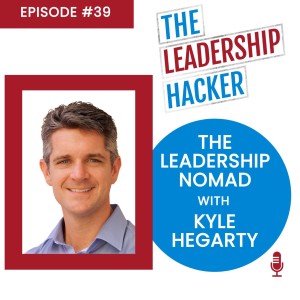
Monday Nov 02, 2020
The Leadership Nomad with Kyle Hegarty
Monday Nov 02, 2020
Monday Nov 02, 2020
Kyle Hegarty is the founder and CEO of Leadership Nomad, he’s coach, speaker and a marketing expert also the author of The Accidental Business Nomad. In this episode we can learn about:
- How to lead in a shrinking world
- Invisible culture can trip us all up
- Local geographical cultural awareness is so key global success
- Global communication styles differ, adapt or else.
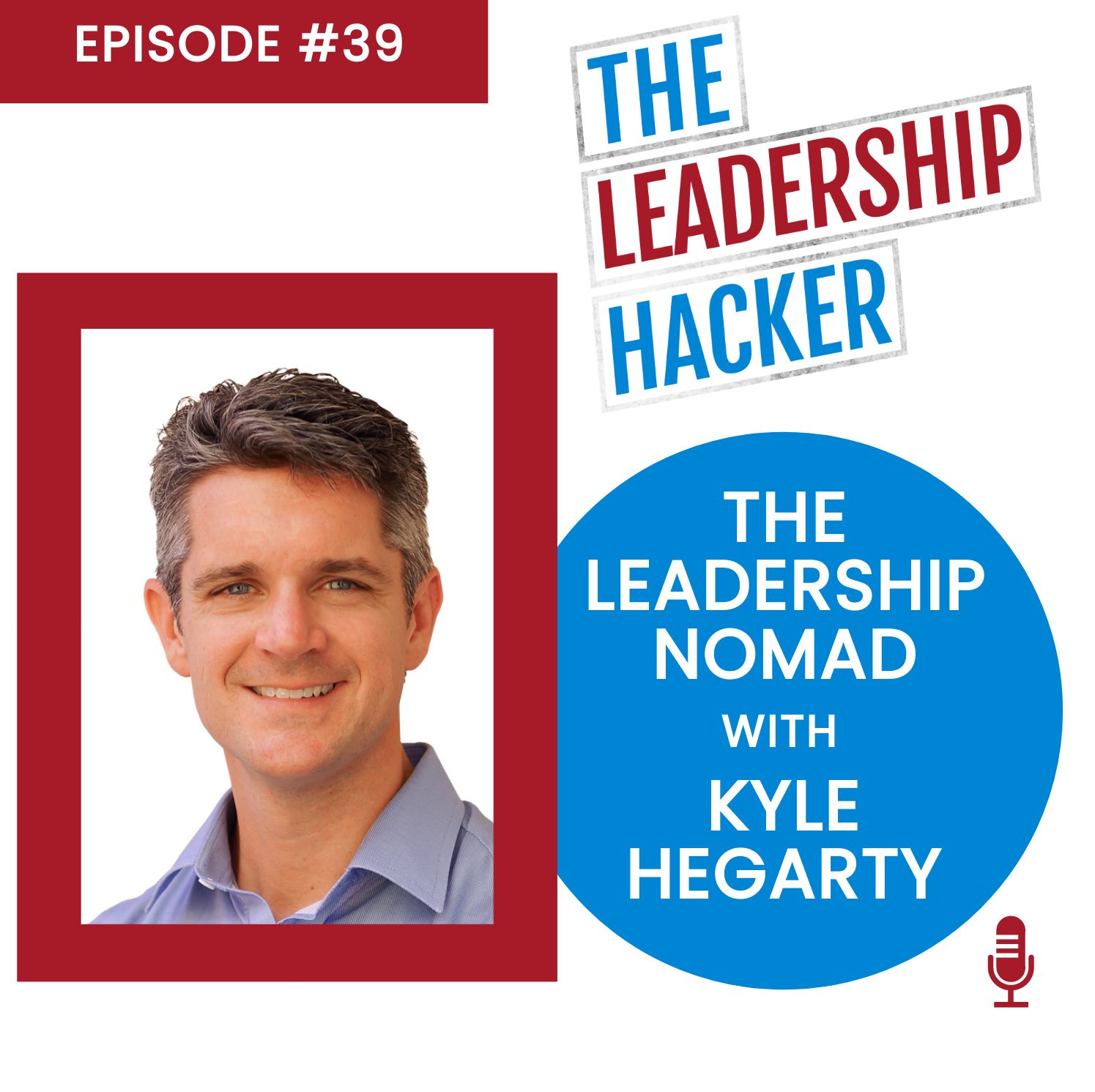
Follow us and explore our social media tribe from our Website: https://leadership-hacker.com
Music: " Upbeat Party " by Scott Holmes courtesy of the Free Music Archive FMA
Transcript: Thanks to Jermaine Pinto at JRP Transcribing for being our Partner. Contact Jermaine via LinkedIn or via his site JRP Transcribing Services
Find out more about Kyle:
Kyle on LinkedIn
Book: The Accidental Business Nomad
Full Transcript Below
Read the rest of this entry »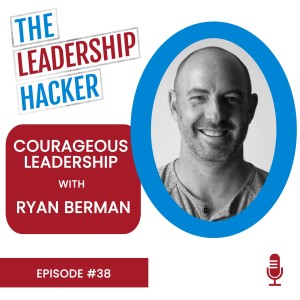
Monday Oct 26, 2020
Courageous Leadership with Ryan Berman
Monday Oct 26, 2020
Monday Oct 26, 2020
Ryan Berman is the founder of Courageous, the author of the book “Return on Courage”, a keynote speaker and host of The Courageous Podcast. In today's show we explore:
- Why courage is a prerequisite for leadership
- The definition of courage
- What’s common between all courageous leaders
- Understand your core values to assist in unlocking courage.
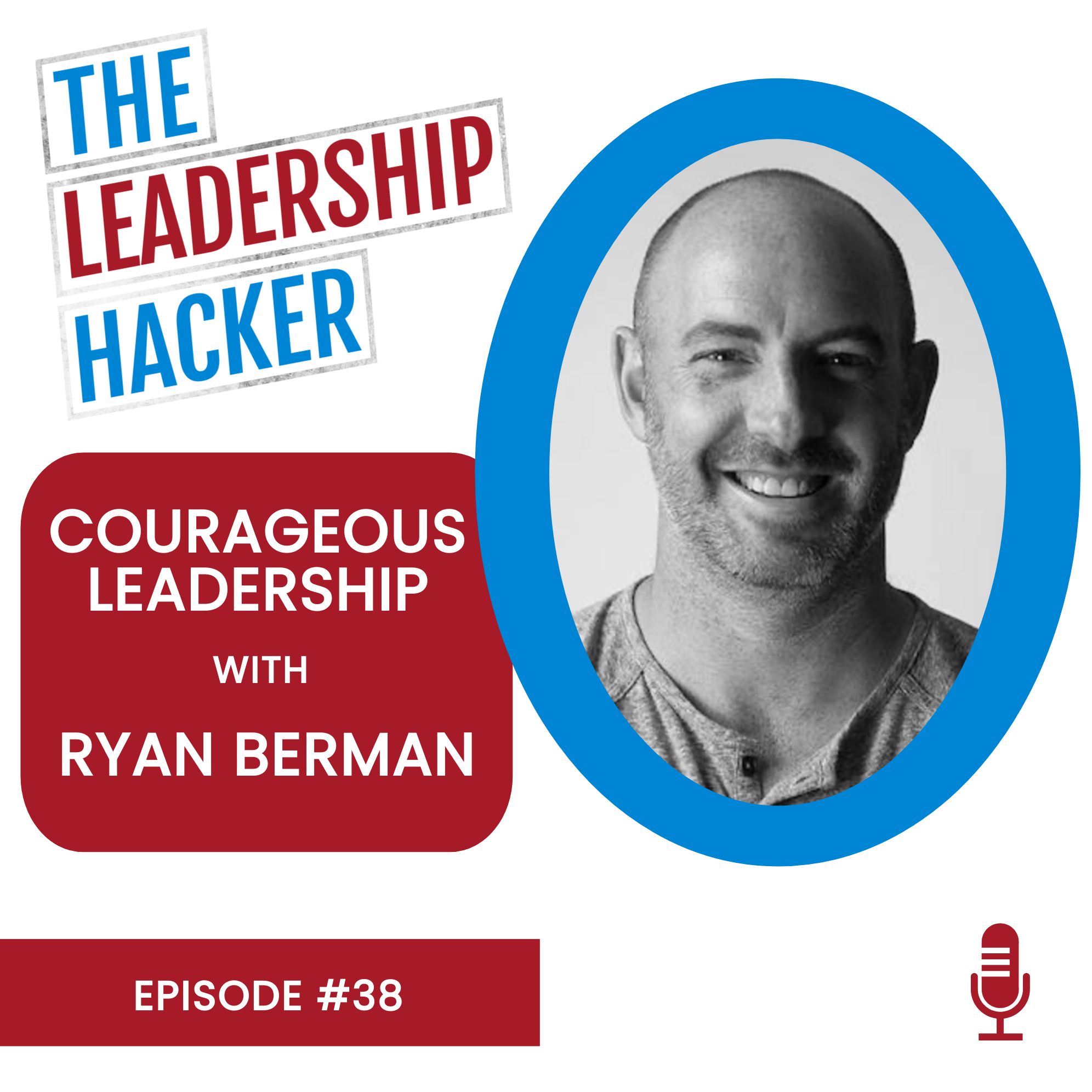
Follow us and explore our social media tribe from our Website: https://leadership-hacker.com
Music: " Upbeat Party " by Scott Holmes courtesy of the Free Music Archive FMA
Transcript: Thanks to Jermaine Pinto at JRP Transcribing for being our Partner. Contact Jermaine via LinkedIn or via his site JRP Transcribing Services
Find out more about Ryan:
Courage Brands Website - https://www.couragebrands.com
Ryan on Twitter
Ryan on Instagram
Full Transcript Below
Read the rest of this entry »
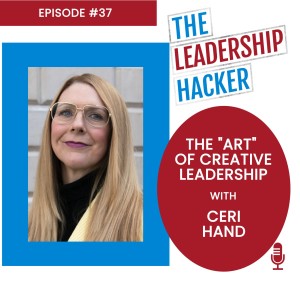
Monday Oct 19, 2020
The Art of Creative Leadership with Ceri Hand
Monday Oct 19, 2020
Monday Oct 19, 2020
Ceri Hand originally trained as an artist, she has extensive experience working with the arts and the culture sector at an executive level, and now coaches Creatives and Artists all over the world through her business, Artist Mentor. In this show you will learn from Ceri:
- The parallels exist between the art world and big business
- How difference makes a difference
- Creative questions could unlock your business purpose
- Why artists are good models for unlocking creativity in business.
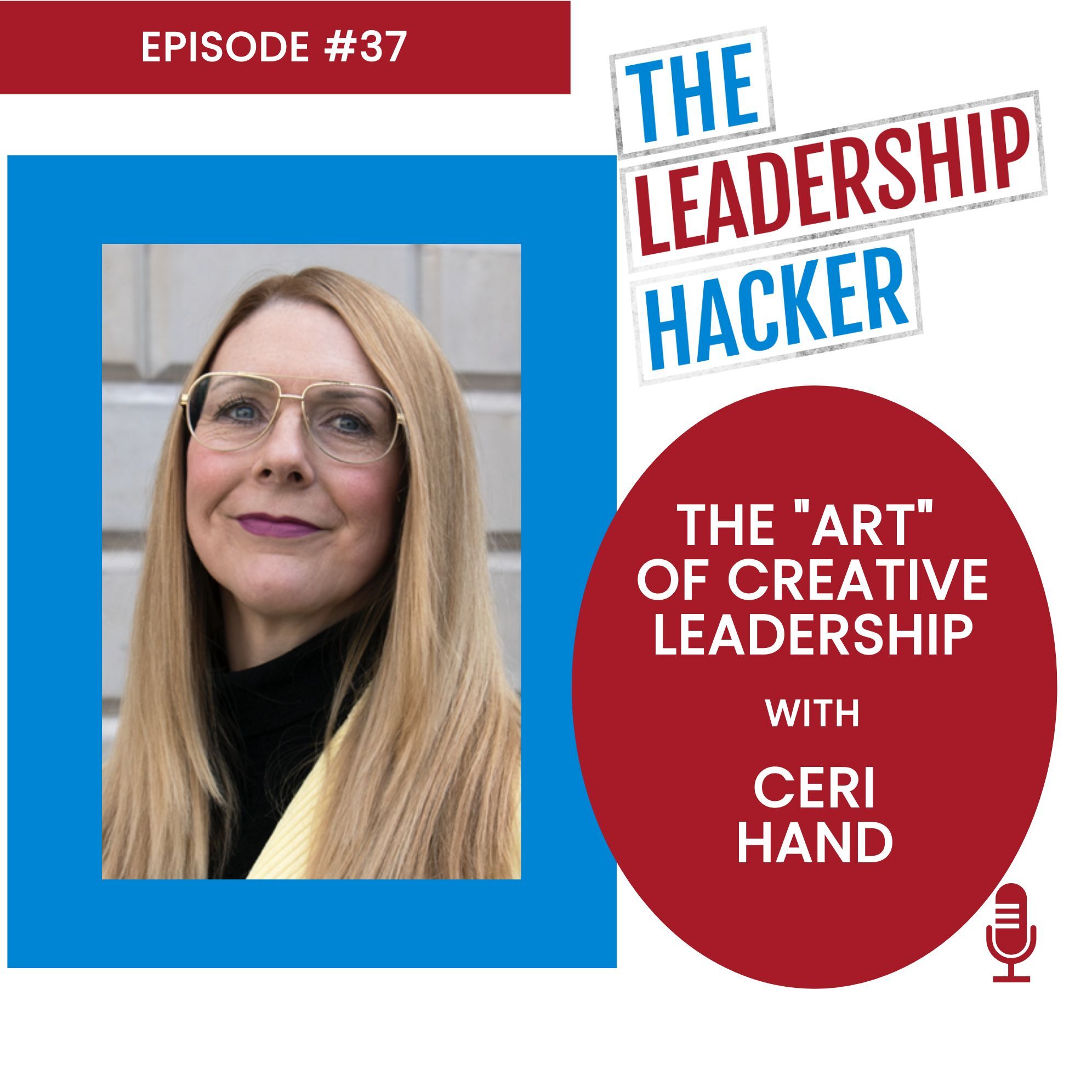
Follow us and explore our social media tribe from our Website: https://leadership-hacker.com
Music: " Upbeat Party " by Scott Holmes courtesy of the Free Music Archive FMA
Transcript: Thanks to Jermaine Pinto at JRP Transcribing for being our Partner. Contact Jermaine via LinkedIn or via his site JRP Transcribing Services
Find out more about Ceri and Artist Mentor:
Artist Mentor Website - http://www.artistmentor.co.uk
Ceri on Twitter
Ceri on Instagram
Ceri on LinkedIn
Full Transcript Below
Read the rest of this entry »
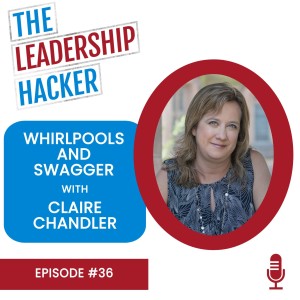
Monday Oct 12, 2020
Whirlpools and Swagger with Claire Chandler
Monday Oct 12, 2020
Monday Oct 12, 2020
Claire Chandler is the president and founder of Talent Boost, a business growth and strategic leadership advisor and also the Author of The Whirlpool Effect. You will learn from Claire in this show:
- How to create your leadership whirlpool
- How to discover your profitable swagger
- Why your “mission” is so important
- How to spot and fix your “churn symptoms.”
- Plus lots more hacks!
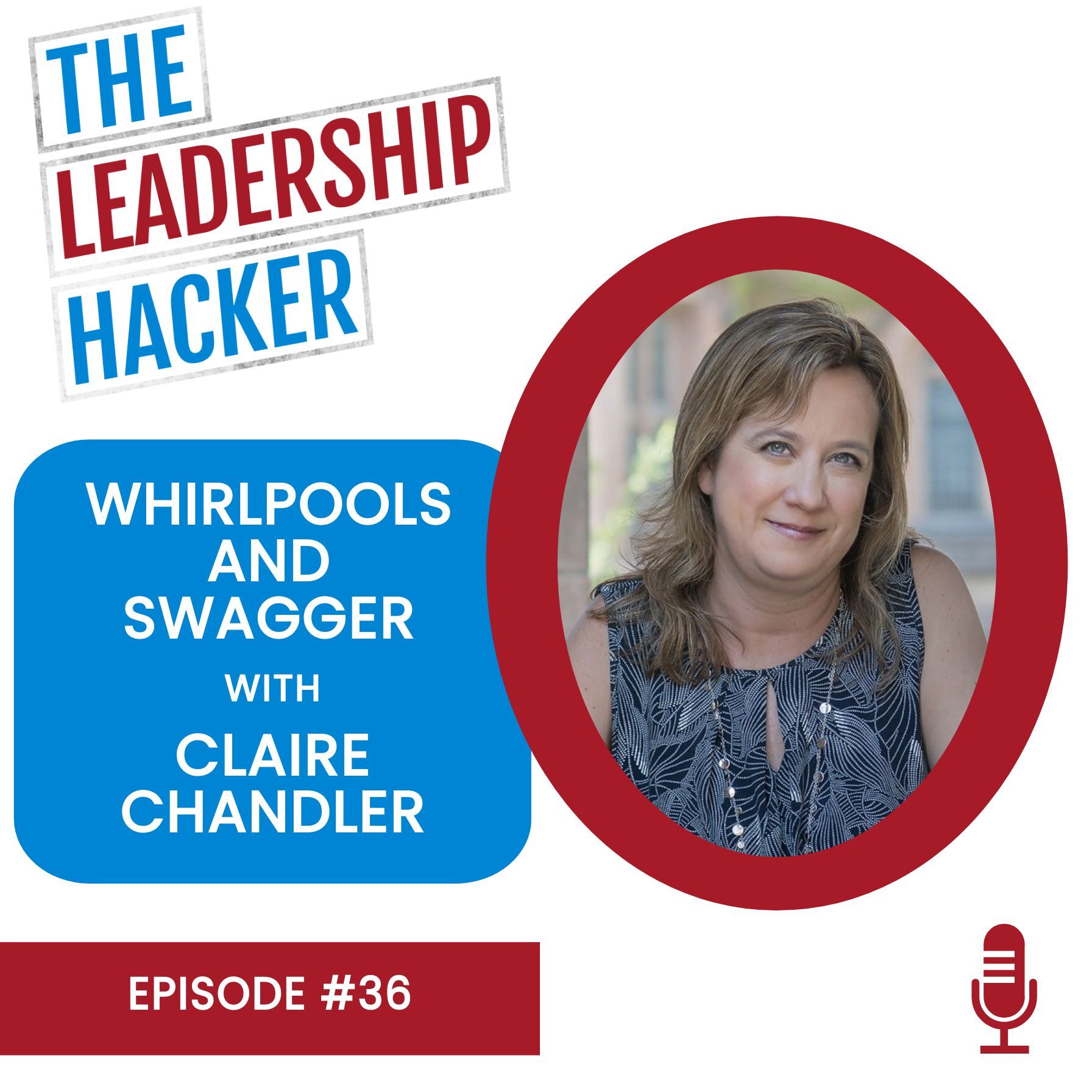
Follow us and explore our social media tribe from our Website: https://leadership-hacker.com
Music: " Upbeat Party " by Scott Holmes courtesy of the Free Music Archive FMA
Transcript: Thanks to Jermaine Pinto at JRP Transcribing for being our Partner. Contact Jermaine via LinkedIn or via his site JRP Transcribing Services
Find out more about Claire and Talent Boost:
Claire Chandler Website
Twitter https://twitter.com/TalentBoost
Claire on LinkedIn
Book: The Whirlpool Effect
Full Transcript Below
Read the rest of this entry »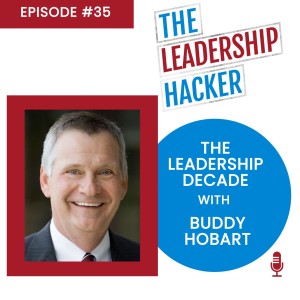
Monday Oct 05, 2020
The Leadership Decade with Buddy Hobart
Monday Oct 05, 2020
Monday Oct 05, 2020
Buddy Hobart is the founder and President at Solutions 21; he's an entrepreneur, speaker, and author of Gen Y Now, Experience Matters, and just launched his latest book, “The Leadership Decade”. You can learn from Buddy:
- How our biases can prevent great leadership
- Why our new era of leadership may need new thinking
- Context and “Why” are a key leadership tool
- Why business owners need to shift their mindset from expense to investment.
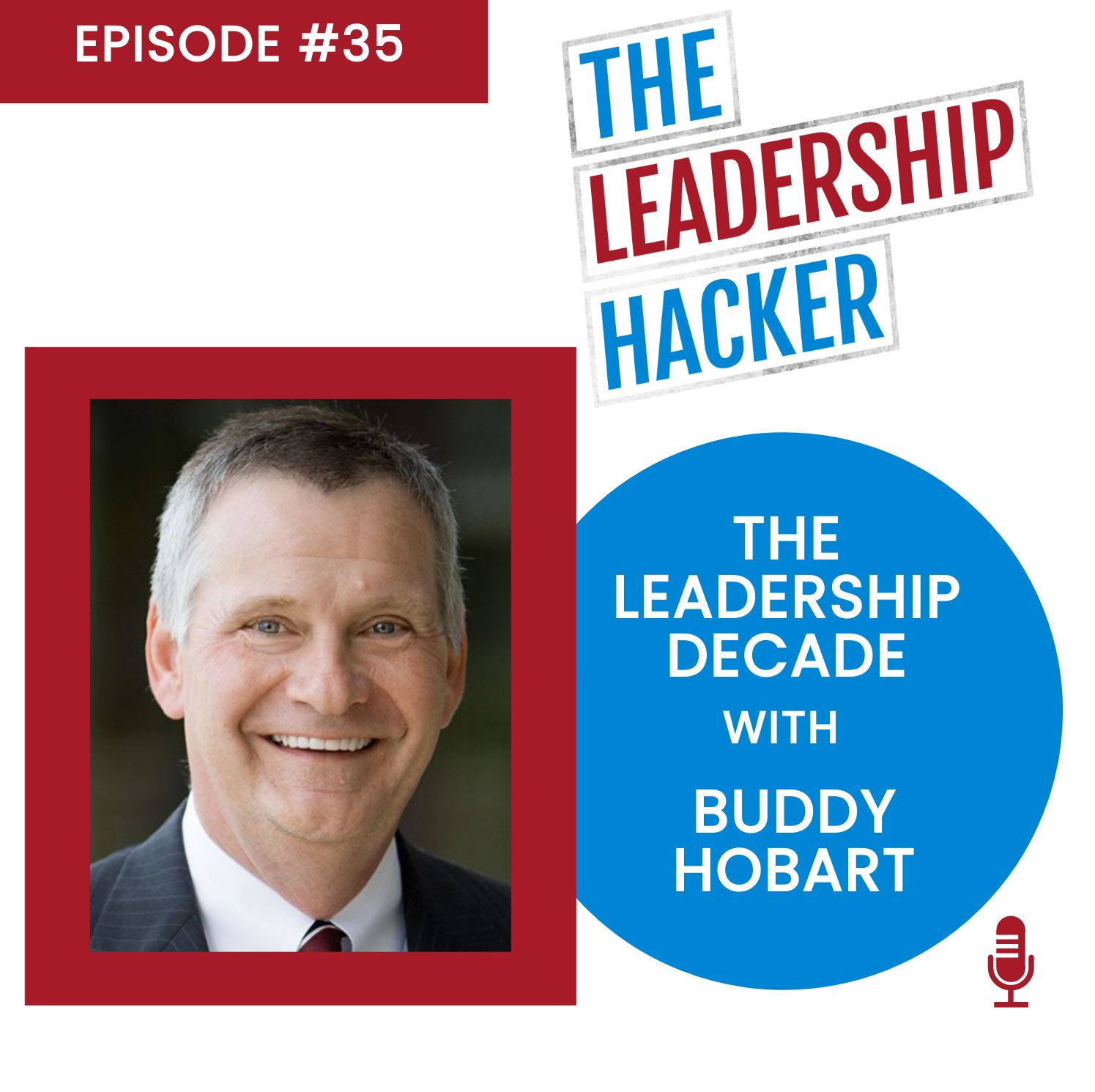
Follow us and explore our social media tribe from our Website: https://leadership-hacker.com
Music: " Upbeat Party " by Scott Holmes courtesy of the Free Music Archive FMA
Transcript: Thanks to Jermaine Pinto at JRP Transcribing for being our Partner. Contact Jermaine via LinkedIn or via his site JRP Transcribing Services
Find out more about Buddy:
Solutions 21 Website
Buddy on LinkedIn
Book: The Leadership Decade
Full Transcript Below
Introduction
Steve Rush: Some call me Steve, dad, husband or friend. Others might call me boss, coach or mentor. Today you can call me The Leadership Hacker.
Thanks for listening in. I really appreciate it. My job as the leadership hacker is to hack into the minds, experiences, habits and learning of great leaders, C-Suite executives, authors and development experts so that I can assist you developing your understanding and awareness of leadership. I am Steve Rush and I am your host today. I am the author of Leadership Cake. I am a transformation consultant and leadership coach. I cannot wait to start sharing all things leadership with you.
Buddy Hobart is the founder and president of Solutions 21. He's our special guest today. He's a consultant and entrepreneur, author of five books, speaker and radio host. But before we get a chance to meet with Buddy, it's The Leadership Hacker News.
The Leadership Hacker News
Steve Rush: Two fifths of executives are citing that soft skills are going to play a key factor in ongoing post pandemic related uncertainty. In some recent research completed by Robert Half a global recruitment and advisory firm, 29% of employees are redesigning their job roles to manage the impacts of COVID-19. They've also seen a significant shift in senior figures who are looking to fast track digital transformation for the rest of this year. While a third are still reprioritizing their e-commerce strategies. In a statement, Robert Half UK’s Managing Director, Matt Western said, “the COVID-19 pandemic has changed the way many of us do business both now and in the future, remote working has enabled talent pools around the world to open up, which for some companies means that existing employees with key skills can be redeployed in the short term to deliver business critical roles.
While for others changing of customer demands means up-skill and a reskill has suddenly appeared particularly for digital transformation and e-commerce”. When we consider the term soft skills in the past, this has been linked to things like communication. In my experience, as a consultant and a leadership development coach, there is no such thing as soft skills, hard skills are the things that required that a very challenging through leading and managing, particularly in disruptive times. And if we consider that in some recent research completed by McKinsey's, they suggest that 14% of jobs over the next five years will have either disappeared or be completely redesigned in order to meet the digital environment that we're likely to be working in for the foreseeable future. So how far forward are you thinking as a leader and how much thought are you giving in the roles that you need not just today, but within the next five years, and will that need a redesign? That's been The Leadership Hacker News. If you have any insights, information you'd like us to share, please get in touch.
Start of Podcast
Steve Rush: Buddy Hobart is our special guest on today's show. He's a founder and president at Solutions 21. He's an entrepreneur, speaker and author of his bestselling book Gen Y Now, and Experience Matters. And his latest book, The Leadership Decade has just made Inc 5000. Buddy it is super to on the show.
Buddy Hobart: I'm excited about it. Thanks Steve.
Steve Rush: So perhaps for the folks that are listening, who haven't had an opportunity to bump into your work yet, tell us a little bit about the backstory as to how you've arrived at doing what you're doing?
Buddy Hobart: Well, we started 26 years ago; my background is in sales, so I started right out of University, was Xerox Corporation and started into sales and became a general manager of a business. And then I began to realize that as much as I enjoyed the sales process, I also enjoyed the organizational development and the people development side of things. So, on my 35th birthday, I quit my job, actually after probably the best year I ever had. I quit my job and started Solutions 21 and 26 years later, we're still standing.
Steve Rush: That was quite a stark thing to do. Haven't been successful in the world of sales. What was that kind of defining moment?
Buddy Hobart: I just thought that the people development side, when I was the sales leader, I saw all these resources going to the sales department. And then when I became the general manager, now I managed everybody. Sales, service, administrators, anybody, and within all sincerity, probably within a week. I was embarrassed with myself about how I had advocated for all of these resources to always be going to sales when there was a hundred other teammates that weren't getting nearly the same kind of attention, the same kind of resources, the same kind of bonuses. And so, we restructured some things and started to develop the business. And while we did grow sales, we tripled the bottom line by simply having people collaborate and communicate and having a more empowered workforce throughout the whole organization. And I realized I really liked that, that was a passion.
Steve Rush: So, you took that passion and created Solutions 21. What is the key focus of the work you do with all clients now?
Buddy Hobart: Well, it's evolved over the last 26 years, but really for the most part right now we are doing, we still do a tremendous amount of strategic planning. So, we work with mostly small to medium sized firms. Although we've worked with very large organizations around the world and we do strategic planning, helping them to decide what's the game plan, where's the bus headed? How are we going to get there? And so, we do a lot of strategic planning and then we do a tremendous amount of leadership development, both in the C-Suite in next leaders as well. So, who's that next generation of folks? Who are those succession candidates? Who are those people that are going to keep this thing going? And then also supervisory skills. So, you know, the folks out on the shop floor, the folks making things happen, how are they developing their leadership skill sets?
Steve Rush: And I guess that’s changed enormously over the last 26 years from where you started out to how things are today, right?
Buddy Hobart: Unbelievable, I think that's the focus of this next book is that, you know, the first books we wrote about generational leadership and how it was important for folks of my generation, I don't mean to be ageist at all in these conversations, but I'm a baby boomer. And so, folks from our generation who were the dominant generation for so long, the first books were about us understanding the next generations. But this book really is about 21st century leadership. And why it's critical that we leave 20th century kind of leadership techniques and tactics and ideas behind because frankly we have an entirely new workforce
Steve Rush: And that’s always going to be evolving too. Isn't it?
Buddy Hobart: I think it is. I mean, you know, the first books we wrote, we talked about how it was unprecedented, that there were four generations of breadwinners in the workforce. And if you stop to think about that, in the history of the world, there had never been four generations of breadwinners in the workforce. I mean, it just never happened. And as you and I are talking here today, there are now five generations of breadwinners in the workforce. So, I mean, until this mid-century, we're going to be in this kind of leap to leadership for this new group of followers.
Steve Rush: So, what was it that interest you and intrigued you about how different generations behave and how we need to kind of maybe approach them with subtle nuances and different maybe lenses? What were the things that kind of gave you that energy to get into the research and get into the genre?
Buddy Hobart: Well, it probably came from a friend of mine, so the first two books I co-authored with a gentleman named Herb Sendek and Herb is a major college basketball coach here in the United States and coach of the year, in the Atlantic Coast Conference, in the PAC-12 in the Mid-American conference, he's really quieted an established coach. And after the season, one year we were just chatting and he asked me, okay, well, you know what I do, you know, I used to play basketball, you know what I do, but I don't really know what you do. So, tell me about the consulting business. So, I told him about what we do and who we do it for. Clients around the world, and we were chatting and he said, well, you know, you really work across all industries and geographies. He said, but is there anything that you're seeing out there that is kind of universal across all businesses?
Now, Steve, remember this is before I did any research or wrote the book or anything. And I said, yeah, I, you know, businesses are having a hard time attracting and retaining young talent. Like they just can't get people to stay. And he said, why do you think that is? And I got up on my baby boomer soap box and I said, all of the prejudice things, all of the myths, I repeated everything. They're disloyal, they're job jumpers. There, you know, they're soft. They don't want to work hard. Like, I was as prejudice to baby boomers I could be. And Steve, he looked at me and he said, well, wait a minute. Like, what ages are we talking about? And again, I hadn't researched anything. And I said, you know, let's call them 25 something. And he said, Buddy I disagree. And I said, how can you disagree? You asked me the question. Like, how can you disagree? He said, Buddy, that's who I've been recruiting my whole career.
Steve Rush: Right.
Buddy Hobart: And man, it just hit me. And then he looked at me and he said something that I heard years later, actually from a four-star general. And he said, you know, Buddy, by definition leaders have followers. And if you can't adapt your leadership to the followership, you're just not going to be a leader for long. And so, it kind of hit me that I was off and to be completely transparent with you and your listening audience here, that my next thing was okay, open another bottle. And so that the book was born on the second bottle of wine Steve.
Steve Rush: And a lot of great writers need that inspiration. And whether it be wine or good conversation, right?
Buddy Hobart: The first bottle was a little bit more debate. The second bottle was a little more problem solving.
Steve Rush: Unleashing creativity, some would call it even.
Buddy Hobart: No doubt.
Steve Rush: So, as you were kind of going through that whole exploration, when you were writing Gen Y Now, did you bump into a lot of your own prejudices then also turned into learnings for others?
Buddy Hobart: Oh, my Steve. I mean, almost unbelievably so. So, to be again, completely transparent. Herb that evening and through subsequent conversations really did not convert to me. So, as we were writing the book, unbeknownst to him, it was starting to develop into a bit more of a point counterpoint. Where, you know, he would say some positive and strong leadership points and really advocate for these next generations. And then I was taking a bit of a counterpoint approach where I would almost debate him in writing a little bit. And I got the about the fourth or fifth chapter. And anybody that's written knows that once you get that deep into it, you're fairly committed, but I got to the fourth or fifth chapter and had a little bit of a aha moment. I had this kind of road to Damascus conversion as it relates to leadership. And I tore up those first five or six chapters and started all over again.
Steve Rush: Yeah, awesome.
Buddy Hobart: What hit me, Steve was one of the biggest things that converted me, where these generations. These newest generations in the workforce, they don't quite look at it the way we did. So, we being a baby boomer, we try to kind of bifurcate our lives. In fact, we created this term. We try to have like a work life and a family life and a social life. And we created this work life balance phrase. And I tease audiences like, how well is that working for you? It just doesn’t. We made a term up because we were so out of balance and these newest generations in my research in the first book, it hit me. They don't look at it that way. They don't try to pretend there's two or three of them. They know there's only one of them and time is life. And they don't try to separate that. They realize when they go to work, they're living, when they come home from work, they're living. The boss they choose to work for is a choice that the projects they work on, those are choices. And we baby boomers and then by extension Gen X, we didn't get that. We try to separate that and that's just not true. There is only one of us and when I saw the wisdom in that thinking, I literally tore up six chapters and start it over.
Steve Rush: Yeah, it's really interesting, isn't it? And you and I have spoken about this before, because we share this similar passion around how the generations more often have different perspectives on the world, and in essence, many conversations I've had with people that says, aren't you just Pidgeon holing people into brackets and giving them labels? And whilst yes, we're definitely generalizing. There is a fundamental shift in thinking that comes with the experiences, the belief systems and the revelations that each of those different generations have had. Right?
Buddy Hobart: No doubt about it. And you know, there's 78 million baby boomers in America. You can't put 78 million people in a bucket. You know, there are more millennials in China than there is population of the United States. You can't put 350 million Chinese millennials into one bucket, that's not fair. But to your point, there are certain things that define generations. You know, I'm fascinated at the moment. My mother-in-law's is moved in with us and she's 93. So, she's a member of that greatest generation. And she's a product of the great depression in World War II. And to ignore how that affected her as a young teenager, I think would be folly. Now are all traditionalist the same? No, by no means, but are folks who had those same similar life experiences, did they learn similar things? Absolutely. And I think it's ridiculous that I would try to apply my experience to everybody's experience.
Steve Rush: Right and I guess, whatever generation you're in, we always have a perception that it's moving faster, quicker than it ever has before. And a perfect example of that is 500, 600 BC Heraclitus famous Greek Philosopher said the only one thing that is constant in life is change. And here we are two and a half thousand years later, and we still have that lens. What do you think causes that Buddy?
Buddy Hobert: Well, a number of things. So, in this latest book, I didn’t quite finish my thought
when I was talking before about what got me interested in this and what really got me interested in this was my own prejudice and realizing the hurdles that I personally had to overcome to understand this. So, the first books were written to help other folks understand who this next generation of the workforce will be. Well, this latest book, The Leadership Decade really is not about millennials or any particular generation because frankly, that ship has sailed, right? I mean the oldest millennial this year is turning 40. So, that ship has sailed. We're not talking about these kids anymore. We're talking about generations and so when I started to write this book, I wanted to answer that exact question you just asked, which is why do we continue to think this way? And so I wrote an entire chapter on kind of the science around this and the biases we bring to it.
And the attribution errors that we bring to it. And one of the things in the book I talk about is the fundamental attribution error, which is where we fundamentally attribute to us, to ours, what is good and right? And we fundamentally attribute to the other, since they do it differently than us, we attribute how they do it to be wrong. Where instead of different equals different, we have this mental model of different equals wrong. And so, I think one of the reasons why that quote has been able to survive the way it's been able to survive is that we fight change. We want to attribute the way we do it to being the correct way to do it, versus embracing any amount of difference or change or innovation.
Steve Rush: And there's no doubt that we are in an era of incredible change and fast paced challenges that are coming through thick and thin, whatever you are and whatever you do. But what is also sure is what worked in the past from a leadership perspective is not going to be fit for the future. Right?
Buddy Hobert: Absolutely and I think that if there is a silver lining to COVID-19 and that certainly remains to be seen, but if there is, I think one of those silver lining, historically is going to be that it forced us into this new Dawn. And you hear a lot of conversation around this inflection point. And even prior to the global pandemic, we had researched the industrial revolutions and came to the conclusion that 2020 was going to be an inflection point and a launch into this next industrial revolution. And if there's a silver lining to COVID-19, and like I said, that remains to be seen. The one silver lining is going to be that it left no doubt that we are in a new century. That 20th century kind of tug of wars on what leadership looked like and what work looks like. Those tug of wars are over, in the 21st century is clearly one. And this inflection point has forced many of us to make very quick, very decisive decisions to be able to change quickly and adapt quickly, versus taking years to figure this out.
Steve Rush: Yeah, and for those of us that are in leadership and leadership development and have a responsibility, what an exciting place it is to be, to find new ways of working, to find whatever the new leadership playbook is.
Buddy Hobert: There is no doubt. Normally, Steve, when these things happen, they're a little bit more evolutionary, right? Where I kind of visualize this as like a daunting. Where, you know, the sun starts to peak up and gets lighter and lighter and lighter, and it takes some time. So, this was going to happen anyway. The statistics, the numbers don't lie, and so 2021, 2022, 2023, people are going to kind of be able to ease their way into this, where we went from 4.7 million Americans telecommuting in December to 75 million telecommuting in March. Like there was no daunting, this was a spotlight, this was a light switch that was thrown. And it forced us to understand we are in an absolutely new era if that is going to require new leadership skills.
Steve Rush: Yeah, so you call this the sweet spot in time, don’t you?
Buddy Hobert: I do, I think that small to medium sized businesses, as fortune 500, by the way, but small to medium sized businesses can be more like a speedboat. Like they don't need a lot of ocean to turn. They can make quick decisions, they can adapt, they can adjust. And I think there's a sweet spot in time where talent acquisition and make no mistake. The team with the best talent usually wins and small to medium sized business, have an opportunity to attract and retain talent that in decades past was kind of set aside for fortune 500 or fortune 50. And there is this sweet spot in time where the new generation of workers want to attach their career wagon to a strong leadership works. They want to work for people that are strong leaders. And at a midsize firm, you can walk down the hall and bump into the CEO. You're not really bumping into the CEO of a fortune 50, if you're a recent university graduate, you know, working on some of your first assignments. So, there is this wonderful opportunity right now for mid-market firms.
Steve Rush: Yeah, I agree. And within the book, The leadership Decade, you've got some great metaphorical stories in there and some lessons that we can pull on, I thought would be just really neat to kick around a few with our listeners.
Buddy Hobert: I would love too.
Steve Rush: So, in Gen Y now, you called out the platform is burning; and in this book, you call out another chapter, which is the platform is still burning. Tell us a little bit about that?
Buddy Hobert: Well, you know, the first books, Steve, I, you know, everything is a bit of a life lesson, right? So, the first book, while maybe it wasn't a mistake, I feel looking back in the rear-view mirror now, the mistake that I made was trying to kind of quote, unquote, sell the audience that this is what was about to happen and share with them some demographic numbers and share with them some, some data and some facts. And I thought facts would win the day and that leaders would understand this need to adapt, and boy was I wrong. It was not a fact-based situation. Once I started to do this brain research, it's emotional based.
And so, when I was pointing out, the platform was burning, what I realized, because we wrote this first book in 2008, and I am quite proud of the fact that going back all of those years, we were advocating for these newest generations because nobody was. They were all negative and negative books towards this generation. So, we were kind of pioneers in the advocacy for developing next generation leaders. And that kind of has helped us a bit, is those pioneers. And what I thought was laying out the data and letting folks know, for example, in the United States that, you know, a baby boomer turns 65, every eight and a half seconds, that every day 10,000 baby boomers are turning 65. That this generation who was the largest generation in the history of the world up to that point was slowly marching to retirement.
I thought pointing that out was going to be important and that folks would get it, but they really didn't. And the platform was burning because there was this kind of silver tsunami where we as baby boomers were all marching to retirement without having had a plan, a succession plan in place. And so, I was quoting John Kotter and his change management philosophies, where he said, if the platform is burning and you have no choice except to change or die, that you will change. And so, I thought people understanding those demographics certainties would look to change, but they didn't. They just kind of ignored it and believe that this too shall pass. And so, in the first books, I wanted to point that out. And in this book, what disappointed me in my research was that in many, many ways, especially small to medium sized businesses, they didn't get the demographic shift. And so, while they had all of this time to begin preparing strong succession plans and strong next generations of leaders and strong bench strength, they didn't. And so, the platform is still burning, except now it's burned where it's really close to now destroying many once strong, small to medium sized companies.
Steve Rush: And there's so much for each of the generations to learn from this kind of philosophy and thinking too, we've now got Gen Z coming into the workforce as they join. They're never going to have the ability to learn from baby boomers and vice versa. If we don't really grab the opportunity now.
Buddy Hobert: There is no doubts know, like I said, a bit of a mistake I made in the first book was I really kind of had that as a one-way street. I was really trying to get the more experienced generations in the workforce to understand the newest generations coming in. And it was really a one-way street. And now this next book that I have, The Leadership Decade is really about this. It's a two-way street. I think Steve you've touched on something really critical here is it is equally important for me as a senior leader or a senior manager or baby boomer. It's equally important for me to understand these newest generations of workers and the newest generation of followers as it is for these newest generation of followers to understand me.
Steve Rush: Absolutely.
Buddy Hobert: In the first books, I didn't get that Steve. I really had it as a one-way street, but there is no doubt that this next decade is all about the organizations who were able to collaborate across generations and understand this is a two-way street and all generations need to be embraced and deployed in the workforce to be productive.
Steve Rush: And very soon as well, you know, we're now seeing people live a lot longer, work a lot longer. There's less pressure on retiring at 60 or 65 or even 70 these days. And before you know it, we'll have generation alpha appearing around the corner.
Buddy Hobert: No doubt about it. And in fact, I'm going to go out on a limb, Steve and say like Generation Z. We know kind of when it started, but you really don't know the end of a generation until there's a Seminole event to define the next generation. And I believe COVID-19 is going to be that Seminole event. So, I'm going to say that we won't know this for a few years, but demographers are going to come out and say, this latest generation. The newest generation probably is going to be from 20 form the year 2000 to 2016. And the reason why I say 16 is because now, four-year olds are affected by COVID-19. They're affected by the global pandemic. They have to be home-schooled; they're going to remember this in ways that we can't understand at the moment. So, I'm going to say, Gen Z is going to stop at 2016 and this latest generation is going to start.
Steve Rush: Interesting.
Buddy Hobert: Think about that. If you're a 50-year-old right now, you will be hiring this sixth generation in 14 years before you retire, you'll be 64. You will be leaving these young folks that are in preschool now. Like it's weird to think that way, but you're going to be hiring kids who were in preschool now who are going to be completely different world views.
Steve Rush: Very true, very true. It's that lens that's really important. Isn't it? It's that being thoughtful and aware that creates that future leadership in others?
Buddy Hobert: I think so. I think that what Herb said is that a leader's job is to adapt to their followership. And I don't want the listeners here to think at all that, that I think leadership is something that is, I don't know, pliable or malleable, or that there aren't these bedrock principles. There certainly are, you know, honesty, integrity. There are certain bedrock principles, but the way that certain things are communicated and certain things are interpreted change from generation to generation. And one example that we've seen with the current pandemic is working remotely. Is that baby boomers grew up with this concept of being present meant you were a hard worker. So, coming in early, staying late, putting in the time, meant you were a hard worker. Being seen was thought as being productive, and now we have learned that that's not true and frankly never was. And people came to work and they might've stayed 12 hours and didn't do anything, that didn't make them a hard worker.
Steve Rush: Very true, really fascinating stuff. In the book Buddy, you talk about the commander’s intent. Tell us what that means?
Buddy Hobert: Five years ago, I had the almost unbelievable good fortune and was humbled by being invited to this place called the US Army War College, and the US Army War College takes American and global military leaders. And you need to be a Lieutenant, Colonel or above, and they put them in these cohorts and they ended up getting a master's degree in strategic leadership. And the last week of the program, they take civilians and they've plugged them into these cohorts. And we go to class with these military leaders, and I was able to see kind of how the best of the best work really, really hard at continuing their leadership development. And I met several military leaders. I'm happy and proud and humble to say, some of them have chosen to now come work for Solutions 21. And they taught me this concept of commander's intent, where it's way different than what I had heard in the business space, where we talk about vision and mission. And if I understand the vision, you know, we can move forward. Understanding the strategy and all that, all that's true. But this idea of commander's intent is to understand from the top. So, the CEO from the commander, all the way down to the shop floor, all the way down to the new hire. If we understand what the commander's intent, what his intent is for the vision and what his intent is for this mission, then we will be able to make quicker, better, more solid real time decisions. If we just know that person's intent, because it might not look exactly like it was scripted. But if we know what the intent of the action is, we can implement it effectively. And we've been using this concept now in the private sector and it's working almost unbelievably. So, it's been a tremendous benefit, especially when the pandemic hit for our clients, that whose employees now we're scattered to the four winds, working remotely to understand the intent. I think that's a different way of looking at it, than businesses have really done over the last number of decades.
Steve Rush: And it creates empathy for their leaders too. If people understand and have context as to why leaders are behaving in the way that they are, what their intentions and ambitions are, then people might not necessarily like the outcomes, but they will have much more respect and therefore likely to take more action.
Buddy Hobert: I think you say something there that's really critical. And that's the word context previous kind of 20th century thought processes and leadership processes really kind of announced decisions without providing context. And the word you just used, I think is critical for us to get is that in the 21st century, we need to also provide that context. And once people understand the context, they can make better quicker and frankly, more productive and profitable decisions.
Steve Rush: Yeah, absolutely, hundred percent agree with that. The final thing I wanted to kick around with the Leadership Decade is something in the book that you call the linchpin model of change. And it's based around the kind of whole Gordian Knot story. Tell us a little bit about how that came about?
Buddy Hobert: I had a lot of information in the last books about change management, and we started talking about this philosophy in the linchpin model, because what we had seen along the way was people hesitating to adapt their thought process to this next generation. We saw this hesitancy of developing next generation leaders and training them and investing in them. We saw it because they were trying to invent the perfect answer. And they were thinking through the whole concept of, okay, should we do it remotely? Is this online? Like they were trying to create the best answer. And then things got watered down, and we came to this conclusion that this linchpin model of change is really the idea that needs to half of which is to do something. Get it started, you create a point where then you can make adjustments, instead of trying to allowing what's the saying, you know, allowing perfect to be the enemy of good, let's get something started and then begin to make adjustments; and as you saw in the book, I use this concept of safety. We do a lot of work in the manufacturing and construction industries. And I realized that safety is now in the DNA of every single firm that those people work in dangerous environments who are in construction, it's now in their DNA. But if you go back maybe only 20 years ago or so, safety was really a strong suggestion, but they've made it a part of their DNA. They took this linchpin approach where they said, and focused and repeated and repeated and repeated this importance and they changed the culture of their organization. And so, we think that developing your next generation of leaders needs to take kind of that almost overly simplistic view is just get started, almost a quote, Nike, Jus do it.
Steve Rush: Yeah, I love it. I love it. So, this is the chance of the show where I get to hack into your great leadership mind. So, I'd love to find out your top three leadership hacks, Buddy, what would they be?
Buddy Hobert: Okay, you touched on one that I want to pick up on when you use the word context. So, if I were to give three of the biggest leadership hacks, what leaders now need to get is we need to get this concept of explaining the why. We, you know, I've had rooms of 1200 folks or I'm keynoting or something. And I say, Hey, look, everybody answered this, and it has been global. So, answer this in your native language. But if you give somebody an assignment and they ask you why what's your response? And in like 14 different languages, I'll here because I said so. And so, we never grew up in an environment where we explained the why of an assessment. We told people what to do, and maybe even we gave suggestions on how to do it, but we never told them why it was important.
And that why is what you brought up earlier, it provides context. And so, when leaders hear someone asked the question why, they hear disrespect and they hear questioning of authority. When in fact they ought to be flattered by that because the person asking is looking for your knowledge and looking for your context. So, the first leadership hack would be to accept when someone asks you, why. They're looking for context and then really take it to the next level and proactively explain the reason for the assignment, explain the why. It provides context, it allows for the commander's intent and you will get a much better end product.
The next thing I might tell leaders as a hack, which is way different than what's happened in the past. Is that leaders today need to develop career coaching skills, not just mentoring skills and helping people, quote and quote, climb a ladder because that's what most folks entered the work world into this corporate ladder. Where now the newest generations of workers are looking at a chess board. They are looking at being able to move horizontally, take one step back, one step up, stay still for a while. And it's way different than a ladder mentality. And while it's true, the newest generations will have more jobs in a lifetime Steve, they don't have to have more companies.
Steve Rush: Right.
Buddy Hobart: If you provide them with opportunity within your firm. And you look at their career development like a chess board, and you look at them as being the queen on the chess board, if anybody there knows how to play chess, if you know the queen can move any way she wants, she's the most powerful piece on the board and in their career. They can move up, down, over one, sideways, horizontal. So, career coaching is going to be a critical leadership component moving forward. And then I would say my third hack would be, I firmly believe that words matter. And that we have to understand what we mean when we say things and how we feel with words. In the past, we looked at the leadership development as an expense. We looked at, if we had a good bottom line, maybe this year we'll do some training, we'll do a couple of events. We'll use this expense dollar. So, when times got tough, we cut that expense.
Well expenses, what’s it means, it's an expenditure, but the term investment is different. Are we investing in our future leaders? Because the word invest means to expect a return. And so, if we are investing, it's not dollar spent, it's an investment for a future return. And I think businesses, business owners need to shift their mindset from expense to investment. And then I think business leaders need to shift their mindset from spending time with my folks versus investing time with my folks. Those mean two completely different things. Spending kind is almost a burden where investing time has an expected return.
Steve Rush: There great hacks and great advice Buddy, thank you for sharing. The next part of the show. We want to explore; we call Hack to Attack. So, this would be where something hasn't worked out as well in your career or your life. But as a result, we've taken that as a lesson and it now serves us well as a positive. What would be your Hack to Attack?
Buddy Hobart: Probably I would hate to admit my naivety, but at times I have been naive in that. I believed a lot of what folks were saying and presenting to be more facts. And I would say that if I had one hack to attack, it would be to understand that there are many, many, many sides to a story and make sure you have all of the information before you make a decision. I would hate to admit that I have been naive along the way. And I have learned this idea that my folks here are probably getting tired of hearing from me, which is control your outcomes. I mean, those elements that you can control, you better control. Otherwise someone will control them for you.
Steve Rush: And I think we can all put ourselves in that space Buddy, that we've had the same kind of level of, I'm not sure if naivety is the right word. It could be maybe trust or overthrust or lack of ambition to control the outcome the way that we want to, maybe.
Buddy Hobart: Yeah, I know that I have been guilty of that and they threw several curve balls at me before I started the Solutions 21, until I began to realize that, well, I appreciate you saying that it's not naive, but in looking back, I think I was overly trusting. Let's say that.
Steve Rush: Cool, the last thing we want to do is give you an opportunity to shift back through the generations and you get to give yourself some advice at 21, Buddy, what's it going to be?
Buddy Hobart: Ah, okay. I can look at my 21-year-old self. I would probably challenge myself to begin working on wisdom sooner, where you would be able to combine the strength and the invincibility of youth with wisdom, you know, instead of waiting for things to come to me, I would have studied a little bit more about making stronger leadership decisions and think through things like developing my emotional intelligence way younger, way younger than I realized I needed to do it as I got older. So that would probably be it. I pray for wisdom every day still. And going back to being that age, I wish I had known then from a wisdom standpoint, what I know now.
Steve Rush: I love that. It's great. Wouldn't it have been neat to have been born with a wise developed brain and then, you know, maybe get more playful as we get older.
Buddy Hobart: Wouldn’t that be? I mean, you would combine all that strength, all the invincibility, all of those elements of your youth with just being able to make wiser and better decisions.
Steve Rush: I've always enjoyed talking with you. I loved reading your books, but I want to make sure that our listeners get the same opportunity. So how can they find out a little bit more about you, Solutions 21? And certainly, The Leadership Decade.
Buddy Hobart: I appreciate that. So, solutions21.com would be our website. So, s-o-l-u-t-i-o-n-s the numbers 21, 21.com, as well as theleadershipdecade.com. You can go to either one of those sites and find more about the book, find more about Solutions 21, find more about what we do and how we help organizations develop their next generations of talent and next generations of leaders.
Steve Rush: That's great, and we'll also put those links in our show notes, Buddy. So, our folk can also head over to there and access them straight away.
Buddy Hobart: Thank you. I appreciate that.
Steve Rush: So, there's no question Buddy, the work you've done continue to do is definitely going to help shape the next generation of leaders and on behalf of our listeners and on behalf of Leadership Hacker Podcast. Thanks for being on the show.
Buddy Hobart: I really, really appreciate it. It's been a pleasure all along.
Closing
Steve Rush: I genuinely want to say heartfelt thanks for taking time out of your day to listen in too. We do this in the service of helping others, and spreading the word of leadership. Without you listening in, there would be no show. So please subscribe now if you have not done so already. Share this podcast with your communities, network, and help us develop a community and a tribe of leadership hackers.
Finally, if you would like me to work with your senior team, your leadership community, keynote an event, or you would like to sponsor an episode. Please connect with us, by our social media. And you can do that by following and liking our pages on Twitter and Facebook our handler their @leadershiphacker. Instagram you can find us there @the_leadership_hacker and at YouTube, we are just Leadership Hacker, so that is me signing off. I am Steve Rush and I have been the leadership hacker
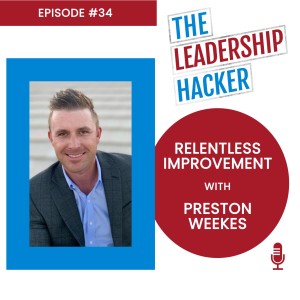
Monday Sep 28, 2020
Relentless Improvement with Preston Weekes
Monday Sep 28, 2020
Monday Sep 28, 2020
Preston Weekes is the Co-author of, "How To Be Up In Down Times” he’s a business builder, an entrepreneur and Chief Strategy Officer/ Co-founder of Operations X. We can learn this from Preston in today’s show:
- How your passion can become your career
- How outsourcing can support your virtual working even more
- Explore soul tips, mind tips and body tips
- The power of relentless improvement
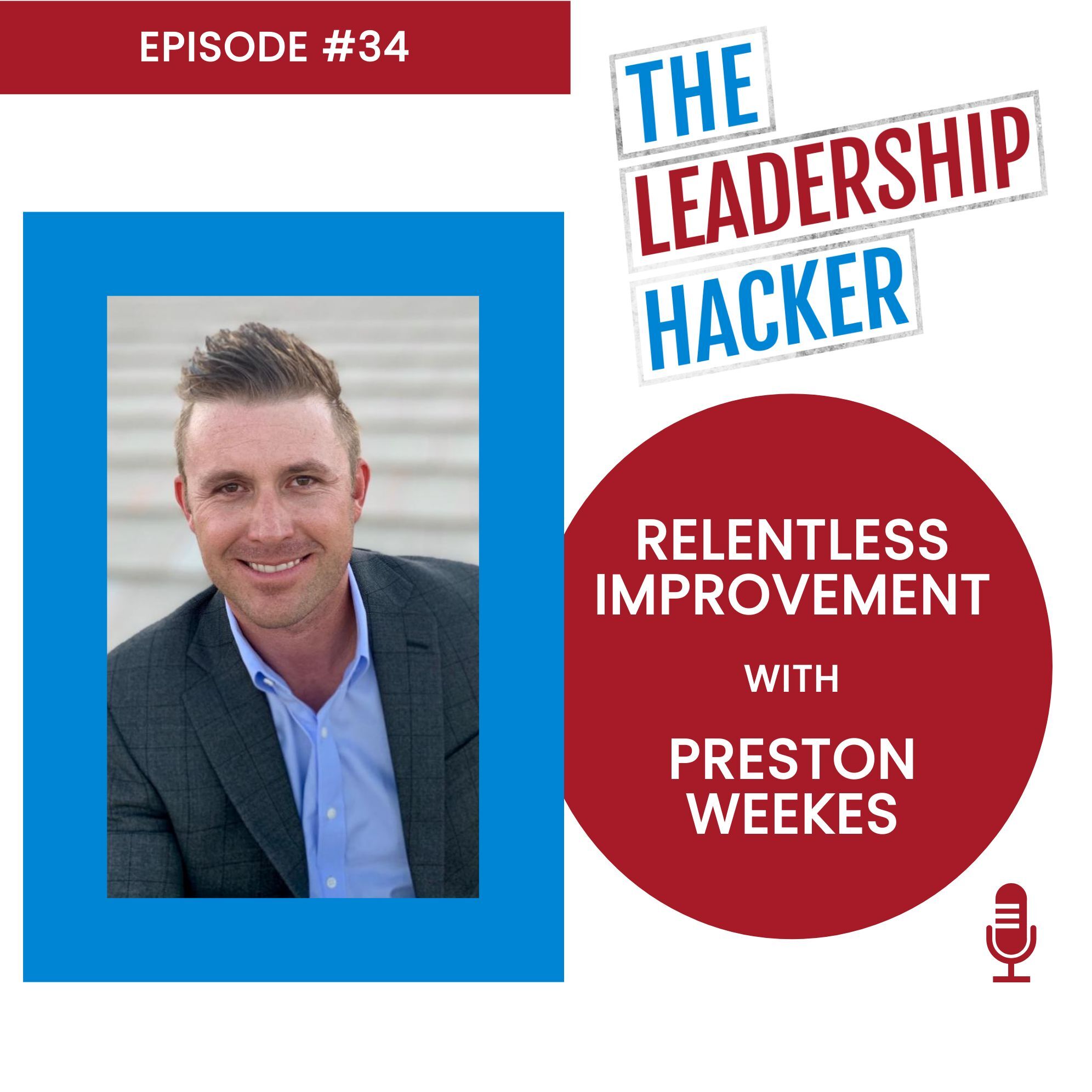
Follow us and explore our social media tribe from our Website: https://leadership-hacker.com
Music: " Upbeat Party " by Scott Holmes courtesy of the Free Music Archive FMA
Transcript: Thanks to Jermaine Pinto at JRP Transcribing for being our Partner. Contact Jermaine via LinkedIn or via his site JRP Transcribing Services
Find out more about Preston:
Operationsx.com Website
Preston on LinkedIn
Book: How to be UP in DOWN times.
Full Transcript Below
Read the rest of this entry »
